CHCECE001 - Develop cultural competence
VerifiedAdded on 2023/06/16
|22
|6604
|460
AI Summary
CHCECE001 is a course that helps individuals develop cultural competence. It covers topics like evaluating significant events in family background, identifying cultural identities, and more. The course also explains the impact of colonization and historical events on Aboriginal and/or Torres Strait Islander people. It provides information on how to obtain knowledge of local cultural groups and develop support activities that encourage participation by relevant cultural groups. Families can share their context and cultural knowledge to enhance their experience of cultural diversity.
Contribute Materials
Your contribution can guide someone’s learning journey. Share your
documents today.
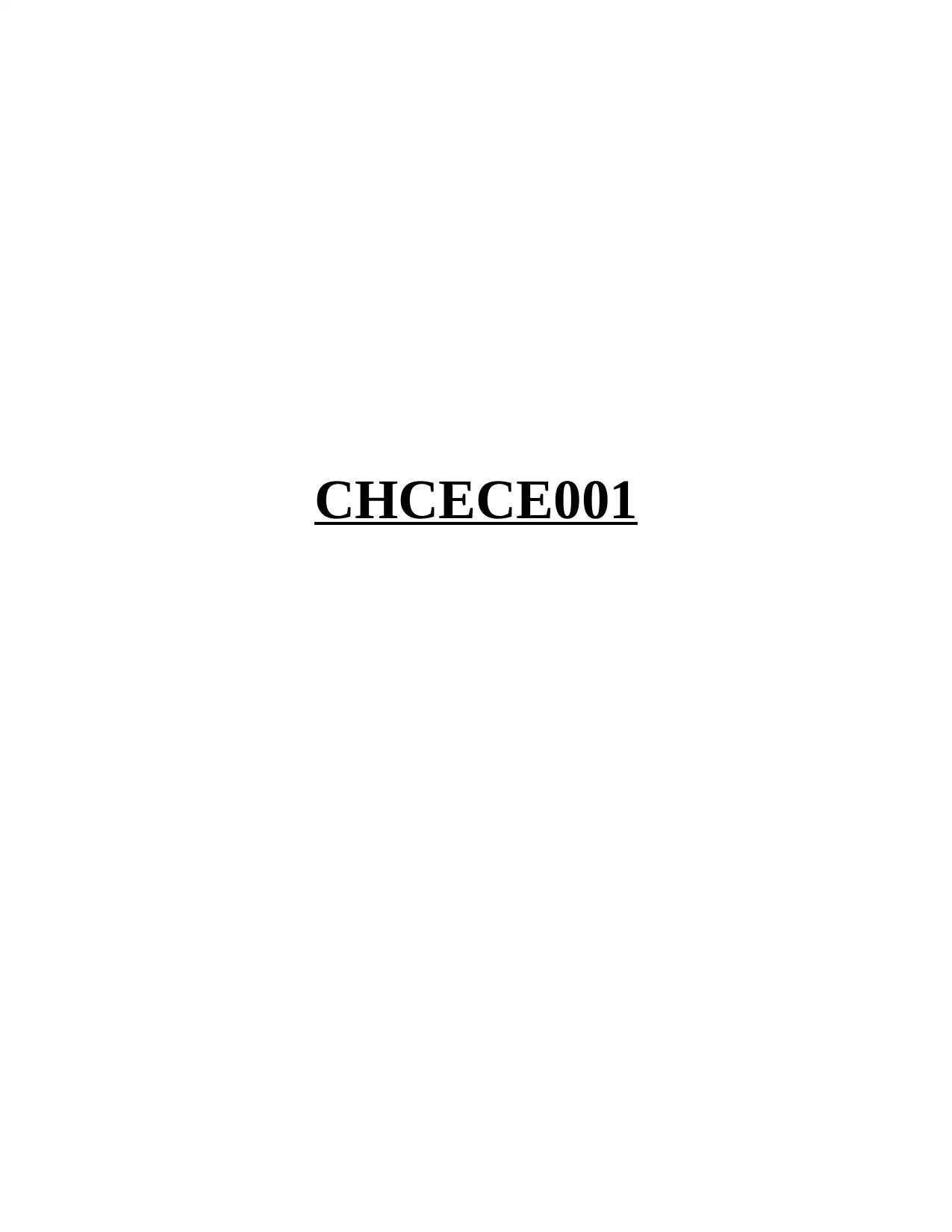
CHCECE001
Secure Best Marks with AI Grader
Need help grading? Try our AI Grader for instant feedback on your assignments.
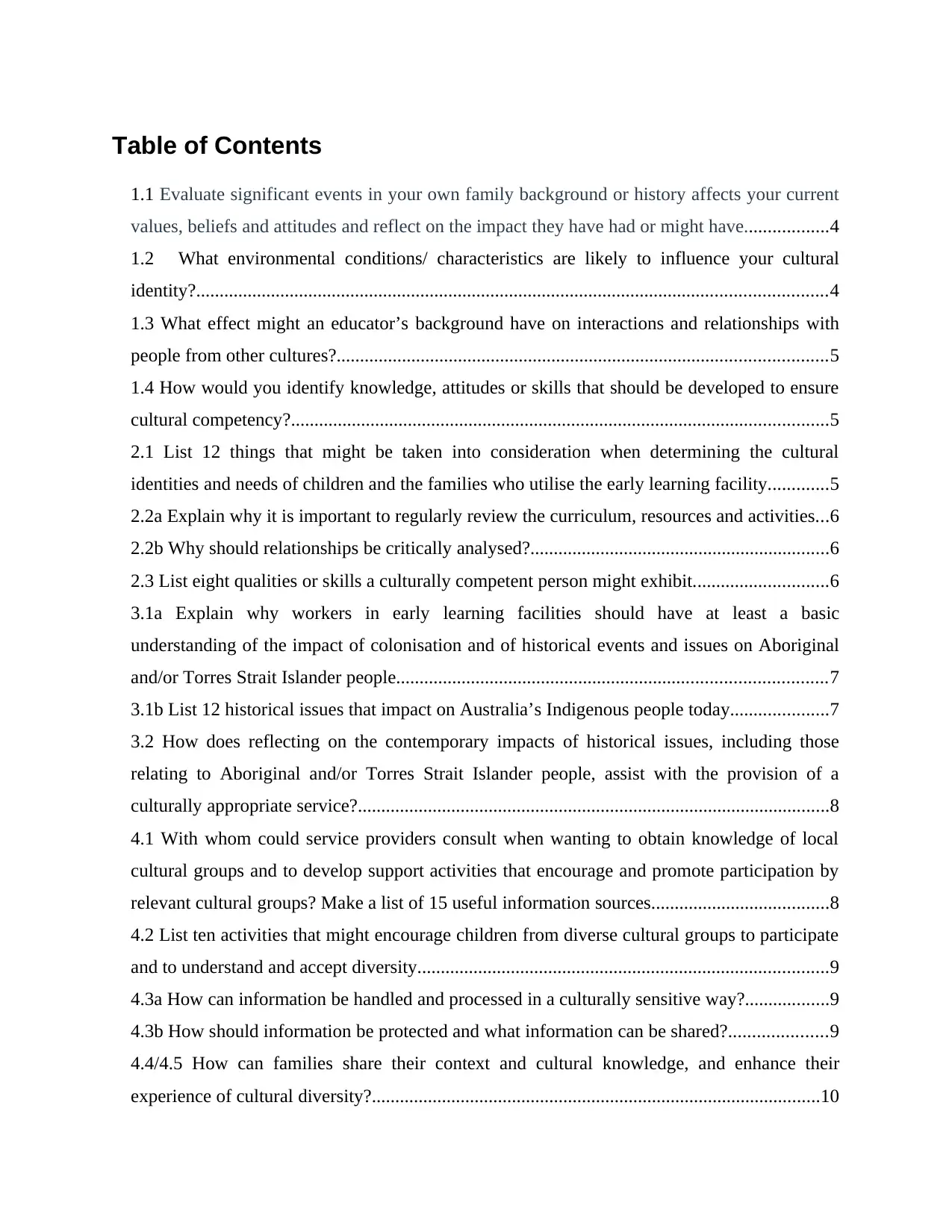
Table of Contents
1.1 Evaluate significant events in your own family background or history affects your current
values, beliefs and attitudes and reflect on the impact they have had or might have..................4
1.2 What environmental conditions/ characteristics are likely to influence your cultural
identity?.......................................................................................................................................4
1.3 What effect might an educator’s background have on interactions and relationships with
people from other cultures?.........................................................................................................5
1.4 How would you identify knowledge, attitudes or skills that should be developed to ensure
cultural competency?...................................................................................................................5
2.1 List 12 things that might be taken into consideration when determining the cultural
identities and needs of children and the families who utilise the early learning facility.............5
2.2a Explain why it is important to regularly review the curriculum, resources and activities...6
2.2b Why should relationships be critically analysed?................................................................6
2.3 List eight qualities or skills a culturally competent person might exhibit.............................6
3.1a Explain why workers in early learning facilities should have at least a basic
understanding of the impact of colonisation and of historical events and issues on Aboriginal
and/or Torres Strait Islander people............................................................................................7
3.1b List 12 historical issues that impact on Australia’s Indigenous people today.....................7
3.2 How does reflecting on the contemporary impacts of historical issues, including those
relating to Aboriginal and/or Torres Strait Islander people, assist with the provision of a
culturally appropriate service?.....................................................................................................8
4.1 With whom could service providers consult when wanting to obtain knowledge of local
cultural groups and to develop support activities that encourage and promote participation by
relevant cultural groups? Make a list of 15 useful information sources......................................8
4.2 List ten activities that might encourage children from diverse cultural groups to participate
and to understand and accept diversity........................................................................................9
4.3a How can information be handled and processed in a culturally sensitive way?..................9
4.3b How should information be protected and what information can be shared?.....................9
4.4/4.5 How can families share their context and cultural knowledge, and enhance their
experience of cultural diversity?................................................................................................10
1.1 Evaluate significant events in your own family background or history affects your current
values, beliefs and attitudes and reflect on the impact they have had or might have..................4
1.2 What environmental conditions/ characteristics are likely to influence your cultural
identity?.......................................................................................................................................4
1.3 What effect might an educator’s background have on interactions and relationships with
people from other cultures?.........................................................................................................5
1.4 How would you identify knowledge, attitudes or skills that should be developed to ensure
cultural competency?...................................................................................................................5
2.1 List 12 things that might be taken into consideration when determining the cultural
identities and needs of children and the families who utilise the early learning facility.............5
2.2a Explain why it is important to regularly review the curriculum, resources and activities...6
2.2b Why should relationships be critically analysed?................................................................6
2.3 List eight qualities or skills a culturally competent person might exhibit.............................6
3.1a Explain why workers in early learning facilities should have at least a basic
understanding of the impact of colonisation and of historical events and issues on Aboriginal
and/or Torres Strait Islander people............................................................................................7
3.1b List 12 historical issues that impact on Australia’s Indigenous people today.....................7
3.2 How does reflecting on the contemporary impacts of historical issues, including those
relating to Aboriginal and/or Torres Strait Islander people, assist with the provision of a
culturally appropriate service?.....................................................................................................8
4.1 With whom could service providers consult when wanting to obtain knowledge of local
cultural groups and to develop support activities that encourage and promote participation by
relevant cultural groups? Make a list of 15 useful information sources......................................8
4.2 List ten activities that might encourage children from diverse cultural groups to participate
and to understand and accept diversity........................................................................................9
4.3a How can information be handled and processed in a culturally sensitive way?..................9
4.3b How should information be protected and what information can be shared?.....................9
4.4/4.5 How can families share their context and cultural knowledge, and enhance their
experience of cultural diversity?................................................................................................10
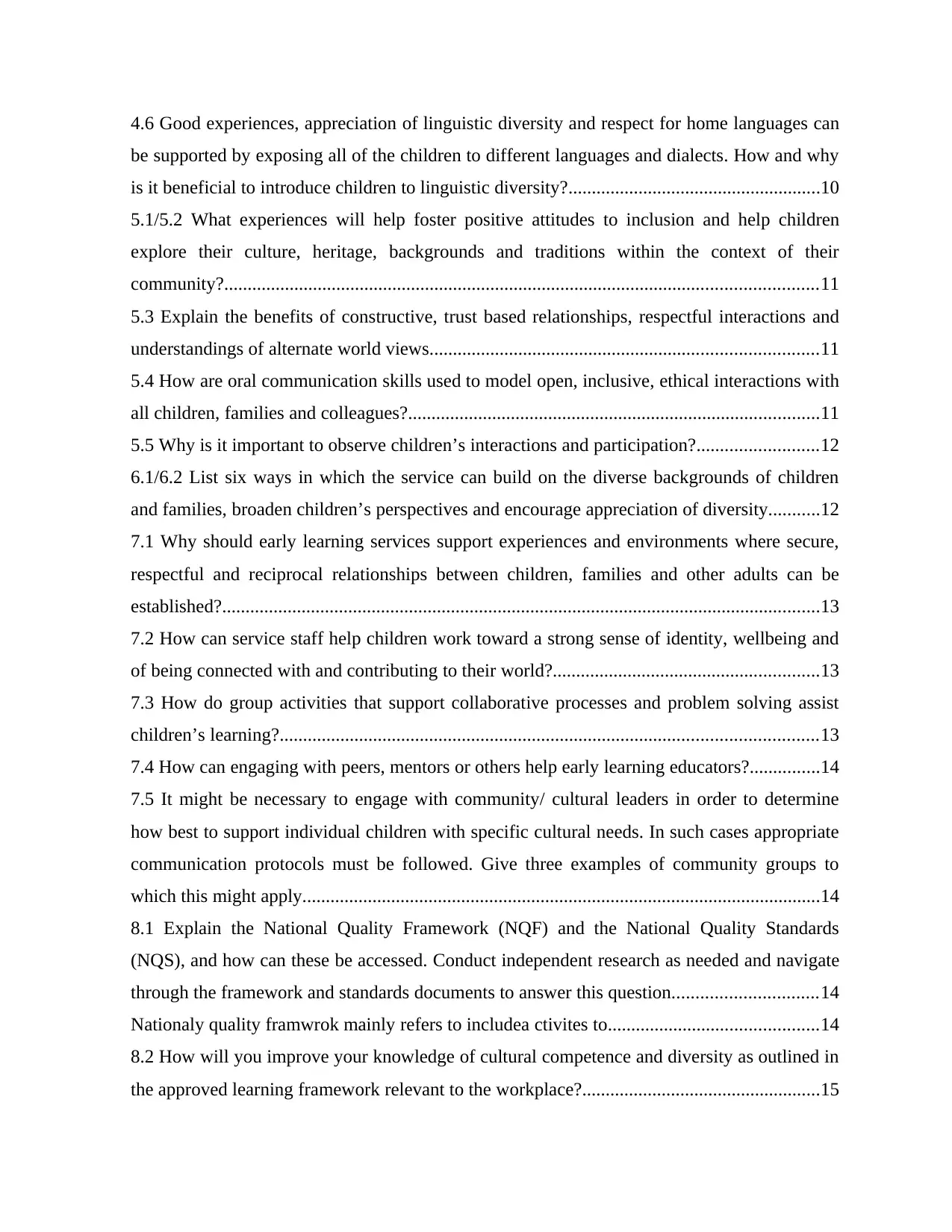
4.6 Good experiences, appreciation of linguistic diversity and respect for home languages can
be supported by exposing all of the children to different languages and dialects. How and why
is it beneficial to introduce children to linguistic diversity?......................................................10
5.1/5.2 What experiences will help foster positive attitudes to inclusion and help children
explore their culture, heritage, backgrounds and traditions within the context of their
community?...............................................................................................................................11
5.3 Explain the benefits of constructive, trust based relationships, respectful interactions and
understandings of alternate world views...................................................................................11
5.4 How are oral communication skills used to model open, inclusive, ethical interactions with
all children, families and colleagues?........................................................................................11
5.5 Why is it important to observe children’s interactions and participation?..........................12
6.1/6.2 List six ways in which the service can build on the diverse backgrounds of children
and families, broaden children’s perspectives and encourage appreciation of diversity...........12
7.1 Why should early learning services support experiences and environments where secure,
respectful and reciprocal relationships between children, families and other adults can be
established?................................................................................................................................13
7.2 How can service staff help children work toward a strong sense of identity, wellbeing and
of being connected with and contributing to their world?.........................................................13
7.3 How do group activities that support collaborative processes and problem solving assist
children’s learning?...................................................................................................................13
7.4 How can engaging with peers, mentors or others help early learning educators?...............14
7.5 It might be necessary to engage with community/ cultural leaders in order to determine
how best to support individual children with specific cultural needs. In such cases appropriate
communication protocols must be followed. Give three examples of community groups to
which this might apply...............................................................................................................14
8.1 Explain the National Quality Framework (NQF) and the National Quality Standards
(NQS), and how can these be accessed. Conduct independent research as needed and navigate
through the framework and standards documents to answer this question...............................14
Nationaly quality framwrok mainly refers to includea ctivites to.............................................14
8.2 How will you improve your knowledge of cultural competence and diversity as outlined in
the approved learning framework relevant to the workplace?...................................................15
be supported by exposing all of the children to different languages and dialects. How and why
is it beneficial to introduce children to linguistic diversity?......................................................10
5.1/5.2 What experiences will help foster positive attitudes to inclusion and help children
explore their culture, heritage, backgrounds and traditions within the context of their
community?...............................................................................................................................11
5.3 Explain the benefits of constructive, trust based relationships, respectful interactions and
understandings of alternate world views...................................................................................11
5.4 How are oral communication skills used to model open, inclusive, ethical interactions with
all children, families and colleagues?........................................................................................11
5.5 Why is it important to observe children’s interactions and participation?..........................12
6.1/6.2 List six ways in which the service can build on the diverse backgrounds of children
and families, broaden children’s perspectives and encourage appreciation of diversity...........12
7.1 Why should early learning services support experiences and environments where secure,
respectful and reciprocal relationships between children, families and other adults can be
established?................................................................................................................................13
7.2 How can service staff help children work toward a strong sense of identity, wellbeing and
of being connected with and contributing to their world?.........................................................13
7.3 How do group activities that support collaborative processes and problem solving assist
children’s learning?...................................................................................................................13
7.4 How can engaging with peers, mentors or others help early learning educators?...............14
7.5 It might be necessary to engage with community/ cultural leaders in order to determine
how best to support individual children with specific cultural needs. In such cases appropriate
communication protocols must be followed. Give three examples of community groups to
which this might apply...............................................................................................................14
8.1 Explain the National Quality Framework (NQF) and the National Quality Standards
(NQS), and how can these be accessed. Conduct independent research as needed and navigate
through the framework and standards documents to answer this question...............................14
Nationaly quality framwrok mainly refers to includea ctivites to.............................................14
8.2 How will you improve your knowledge of cultural competence and diversity as outlined in
the approved learning framework relevant to the workplace?...................................................15
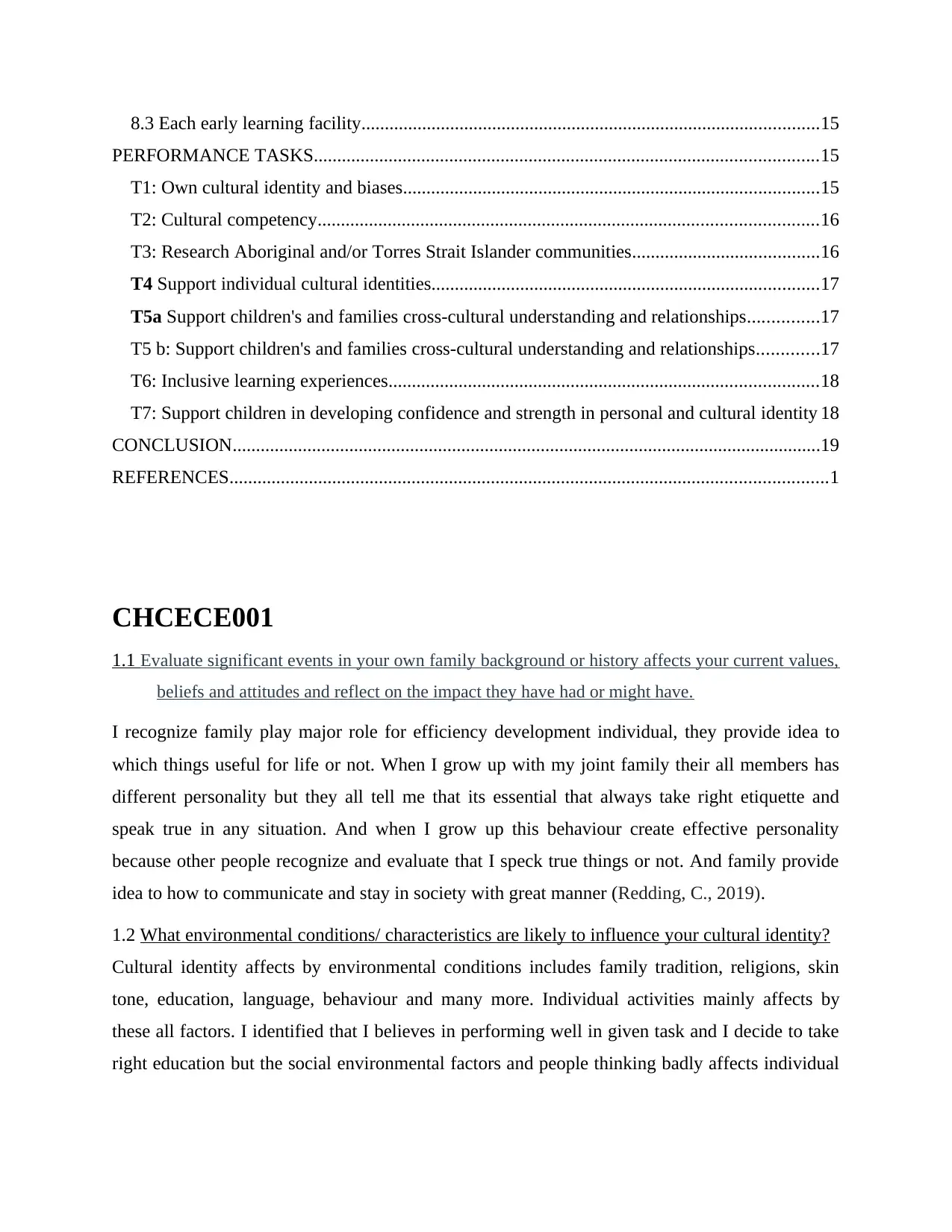
8.3 Each early learning facility..................................................................................................15
PERFORMANCE TASKS............................................................................................................15
T1: Own cultural identity and biases.........................................................................................15
T2: Cultural competency...........................................................................................................16
T3: Research Aboriginal and/or Torres Strait Islander communities........................................16
T4 Support individual cultural identities...................................................................................17
T5a Support children's and families cross-cultural understanding and relationships...............17
T5 b: Support children's and families cross-cultural understanding and relationships.............17
T6: Inclusive learning experiences............................................................................................18
T7: Support children in developing confidence and strength in personal and cultural identity 18
CONCLUSION..............................................................................................................................19
REFERENCES................................................................................................................................1
CHCECE001
1.1 Evaluate significant events in your own family background or history affects your current values,
beliefs and attitudes and reflect on the impact they have had or might have.
I recognize family play major role for efficiency development individual, they provide idea to
which things useful for life or not. When I grow up with my joint family their all members has
different personality but they all tell me that its essential that always take right etiquette and
speak true in any situation. And when I grow up this behaviour create effective personality
because other people recognize and evaluate that I speck true things or not. And family provide
idea to how to communicate and stay in society with great manner (Redding, C., 2019).
1.2 What environmental conditions/ characteristics are likely to influence your cultural identity?
Cultural identity affects by environmental conditions includes family tradition, religions, skin
tone, education, language, behaviour and many more. Individual activities mainly affects by
these all factors. I identified that I believes in performing well in given task and I decide to take
right education but the social environmental factors and people thinking badly affects individual
PERFORMANCE TASKS............................................................................................................15
T1: Own cultural identity and biases.........................................................................................15
T2: Cultural competency...........................................................................................................16
T3: Research Aboriginal and/or Torres Strait Islander communities........................................16
T4 Support individual cultural identities...................................................................................17
T5a Support children's and families cross-cultural understanding and relationships...............17
T5 b: Support children's and families cross-cultural understanding and relationships.............17
T6: Inclusive learning experiences............................................................................................18
T7: Support children in developing confidence and strength in personal and cultural identity 18
CONCLUSION..............................................................................................................................19
REFERENCES................................................................................................................................1
CHCECE001
1.1 Evaluate significant events in your own family background or history affects your current values,
beliefs and attitudes and reflect on the impact they have had or might have.
I recognize family play major role for efficiency development individual, they provide idea to
which things useful for life or not. When I grow up with my joint family their all members has
different personality but they all tell me that its essential that always take right etiquette and
speak true in any situation. And when I grow up this behaviour create effective personality
because other people recognize and evaluate that I speck true things or not. And family provide
idea to how to communicate and stay in society with great manner (Redding, C., 2019).
1.2 What environmental conditions/ characteristics are likely to influence your cultural identity?
Cultural identity affects by environmental conditions includes family tradition, religions, skin
tone, education, language, behaviour and many more. Individual activities mainly affects by
these all factors. I identified that I believes in performing well in given task and I decide to take
right education but the social environmental factors and people thinking badly affects individual
Secure Best Marks with AI Grader
Need help grading? Try our AI Grader for instant feedback on your assignments.

personality. Family has responsibility to provide information to children to develop them better
understating and provide them information about cultural activities so they evaluate right things
1.3 What effect might an educator’s background have on interactions and relationships with
people from other cultures?
Educators provide best sustainable cultural and provide information to
maintain good relationship with every individual, so they helps to develop better
understanding and provide information to students about every culture are
same and its not good thing that individual develop comparison and
communicate on the basis of their social background. So from the idea about
this term teacher play effective roles for effective society development. They
provide guidance to children and motivated them to maintain good relation with
individual. Also they develop awareness about friendship development, maintain
good and positive relation with different culture and background people.
1.4 How would you identify knowledge, attitudes or skills that should be developed to ensure
cultural competency?
Self awareness development about different cultural activities, identification and their
beliefs, values from their performance, communicate with and identify their perspective about
different people and many more. Its easier to evaluate different cultural activities near to by
society people and their different religion but the major thing is to individual has to develop
practices to communicate and not showing attitude on the basis of their background and their
lifestyles. So individual can easily find and develop self awareness from their near society people
behaviours and believes.
2.1 List 12 things that might be taken into consideration when determining the cultural identities
and needs of children and the families who utilise the early learning facility.
Society values and believes
Gender
Language
Religion
understating and provide them information about cultural activities so they evaluate right things
1.3 What effect might an educator’s background have on interactions and relationships with
people from other cultures?
Educators provide best sustainable cultural and provide information to
maintain good relationship with every individual, so they helps to develop better
understanding and provide information to students about every culture are
same and its not good thing that individual develop comparison and
communicate on the basis of their social background. So from the idea about
this term teacher play effective roles for effective society development. They
provide guidance to children and motivated them to maintain good relation with
individual. Also they develop awareness about friendship development, maintain
good and positive relation with different culture and background people.
1.4 How would you identify knowledge, attitudes or skills that should be developed to ensure
cultural competency?
Self awareness development about different cultural activities, identification and their
beliefs, values from their performance, communicate with and identify their perspective about
different people and many more. Its easier to evaluate different cultural activities near to by
society people and their different religion but the major thing is to individual has to develop
practices to communicate and not showing attitude on the basis of their background and their
lifestyles. So individual can easily find and develop self awareness from their near society people
behaviours and believes.
2.1 List 12 things that might be taken into consideration when determining the cultural identities
and needs of children and the families who utilise the early learning facility.
Society values and believes
Gender
Language
Religion
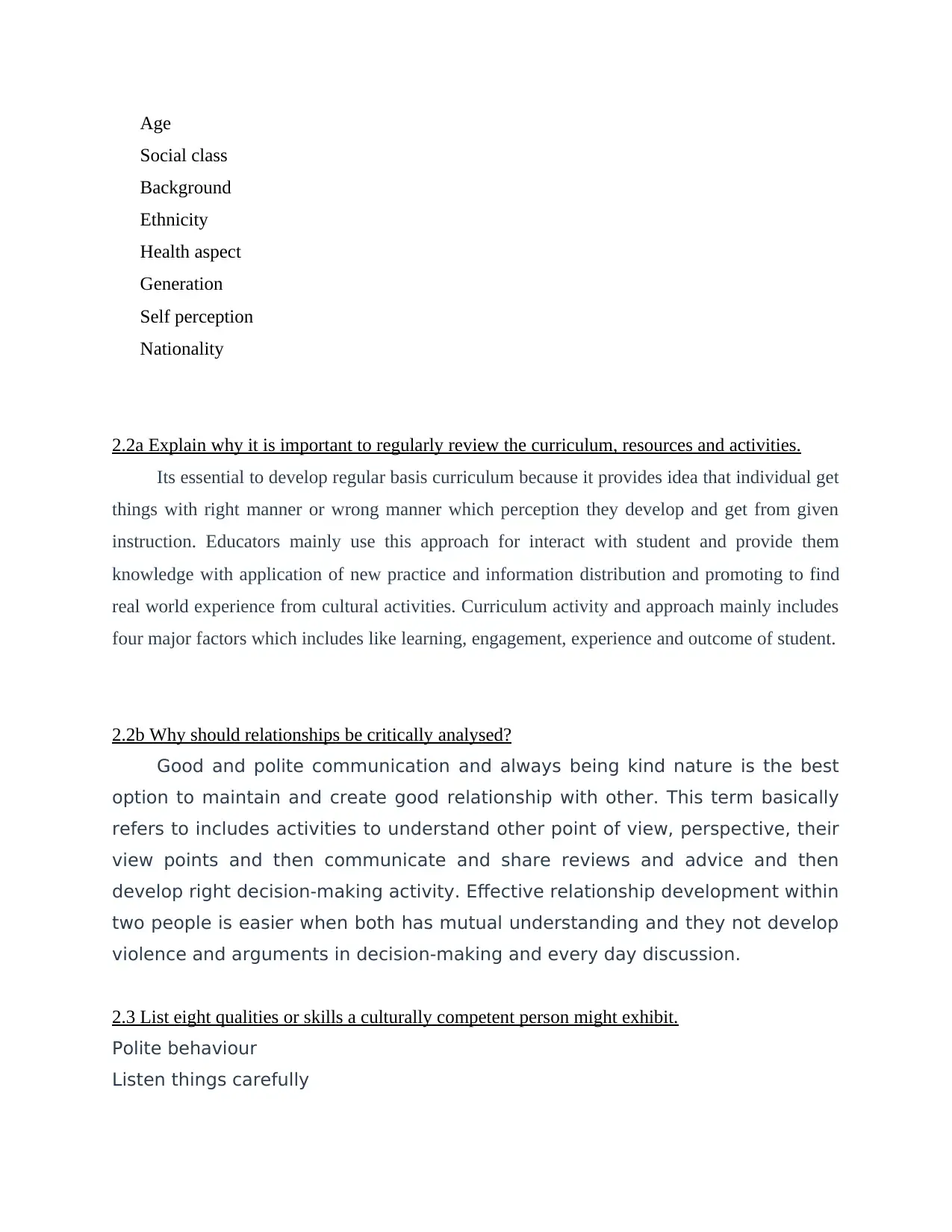
Age
Social class
Background
Ethnicity
Health aspect
Generation
Self perception
Nationality
2.2a Explain why it is important to regularly review the curriculum, resources and activities.
Its essential to develop regular basis curriculum because it provides idea that individual get
things with right manner or wrong manner which perception they develop and get from given
instruction. Educators mainly use this approach for interact with student and provide them
knowledge with application of new practice and information distribution and promoting to find
real world experience from cultural activities. Curriculum activity and approach mainly includes
four major factors which includes like learning, engagement, experience and outcome of student.
2.2b Why should relationships be critically analysed?
Good and polite communication and always being kind nature is the best
option to maintain and create good relationship with other. This term basically
refers to includes activities to understand other point of view, perspective, their
view points and then communicate and share reviews and advice and then
develop right decision-making activity. Effective relationship development within
two people is easier when both has mutual understanding and they not develop
violence and arguments in decision-making and every day discussion.
2.3 List eight qualities or skills a culturally competent person might exhibit.
Polite behaviour
Listen things carefully
Social class
Background
Ethnicity
Health aspect
Generation
Self perception
Nationality
2.2a Explain why it is important to regularly review the curriculum, resources and activities.
Its essential to develop regular basis curriculum because it provides idea that individual get
things with right manner or wrong manner which perception they develop and get from given
instruction. Educators mainly use this approach for interact with student and provide them
knowledge with application of new practice and information distribution and promoting to find
real world experience from cultural activities. Curriculum activity and approach mainly includes
four major factors which includes like learning, engagement, experience and outcome of student.
2.2b Why should relationships be critically analysed?
Good and polite communication and always being kind nature is the best
option to maintain and create good relationship with other. This term basically
refers to includes activities to understand other point of view, perspective, their
view points and then communicate and share reviews and advice and then
develop right decision-making activity. Effective relationship development within
two people is easier when both has mutual understanding and they not develop
violence and arguments in decision-making and every day discussion.
2.3 List eight qualities or skills a culturally competent person might exhibit.
Polite behaviour
Listen things carefully
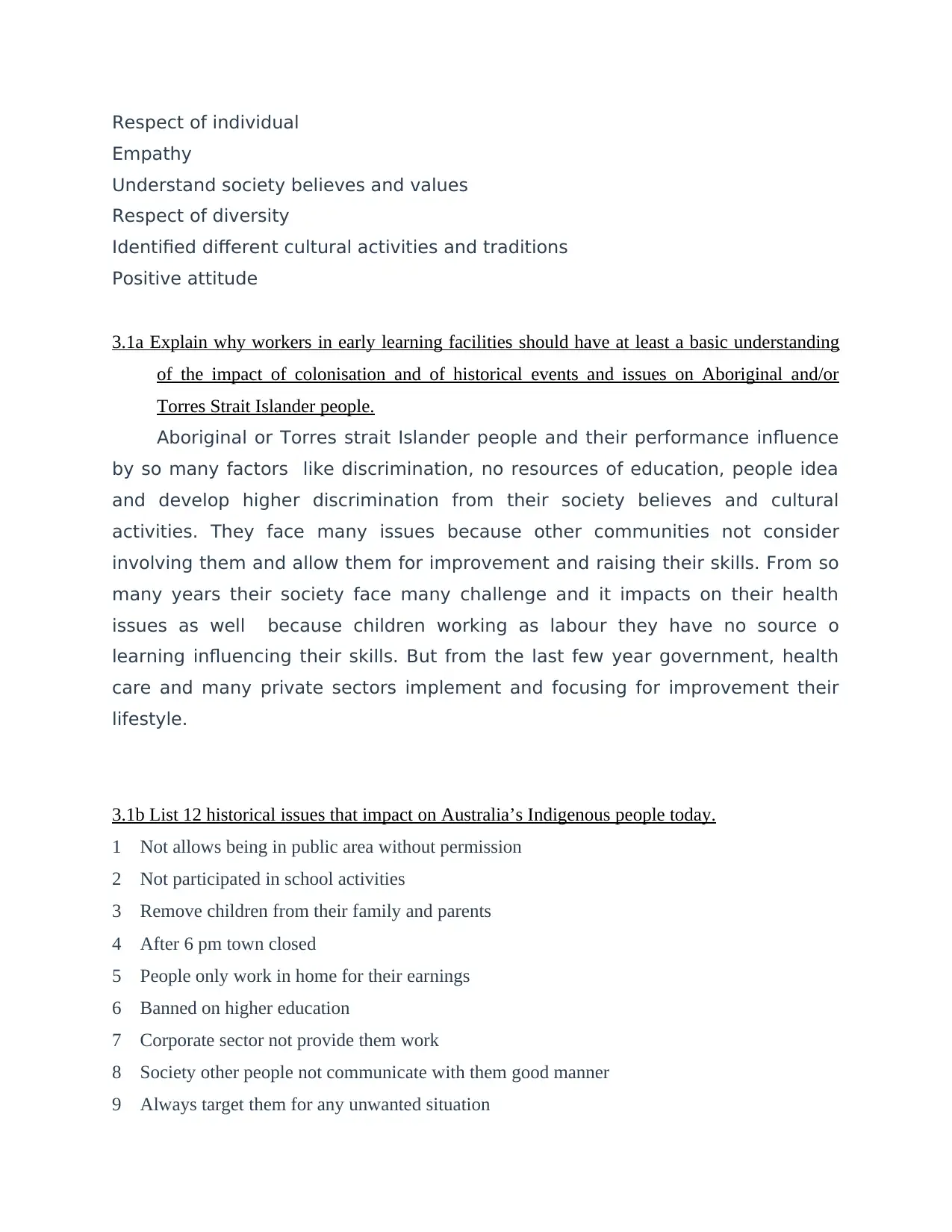
Respect of individual
Empathy
Understand society believes and values
Respect of diversity
Identified different cultural activities and traditions
Positive attitude
3.1a Explain why workers in early learning facilities should have at least a basic understanding
of the impact of colonisation and of historical events and issues on Aboriginal and/or
Torres Strait Islander people.
Aboriginal or Torres strait Islander people and their performance influence
by so many factors like discrimination, no resources of education, people idea
and develop higher discrimination from their society believes and cultural
activities. They face many issues because other communities not consider
involving them and allow them for improvement and raising their skills. From so
many years their society face many challenge and it impacts on their health
issues as well because children working as labour they have no source o
learning influencing their skills. But from the last few year government, health
care and many private sectors implement and focusing for improvement their
lifestyle.
3.1b List 12 historical issues that impact on Australia’s Indigenous people today.
1 Not allows being in public area without permission
2 Not participated in school activities
3 Remove children from their family and parents
4 After 6 pm town closed
5 People only work in home for their earnings
6 Banned on higher education
7 Corporate sector not provide them work
8 Society other people not communicate with them good manner
9 Always target them for any unwanted situation
Empathy
Understand society believes and values
Respect of diversity
Identified different cultural activities and traditions
Positive attitude
3.1a Explain why workers in early learning facilities should have at least a basic understanding
of the impact of colonisation and of historical events and issues on Aboriginal and/or
Torres Strait Islander people.
Aboriginal or Torres strait Islander people and their performance influence
by so many factors like discrimination, no resources of education, people idea
and develop higher discrimination from their society believes and cultural
activities. They face many issues because other communities not consider
involving them and allow them for improvement and raising their skills. From so
many years their society face many challenge and it impacts on their health
issues as well because children working as labour they have no source o
learning influencing their skills. But from the last few year government, health
care and many private sectors implement and focusing for improvement their
lifestyle.
3.1b List 12 historical issues that impact on Australia’s Indigenous people today.
1 Not allows being in public area without permission
2 Not participated in school activities
3 Remove children from their family and parents
4 After 6 pm town closed
5 People only work in home for their earnings
6 Banned on higher education
7 Corporate sector not provide them work
8 Society other people not communicate with them good manner
9 Always target them for any unwanted situation
Paraphrase This Document
Need a fresh take? Get an instant paraphrase of this document with our AI Paraphraser
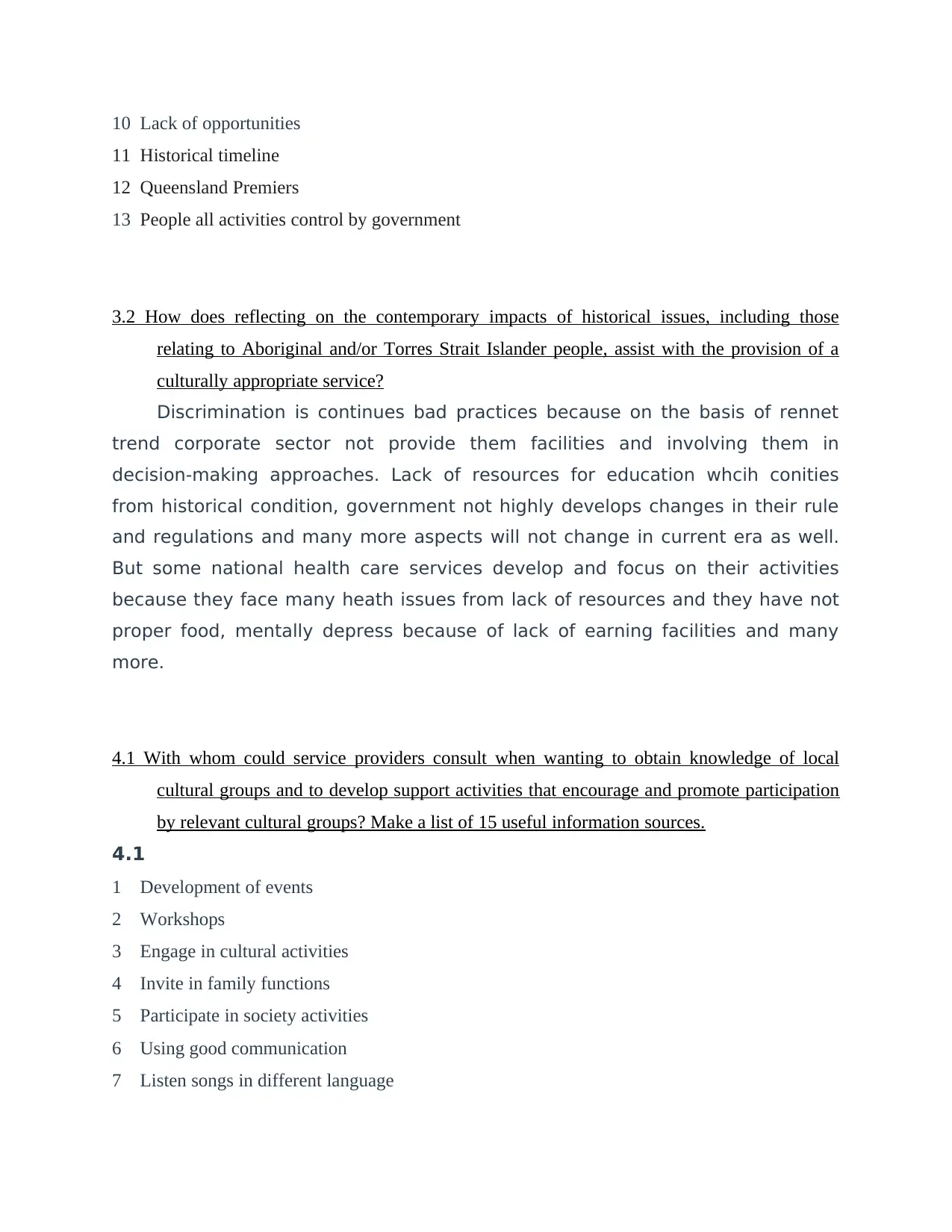
10 Lack of opportunities
11 Historical timeline
12 Queensland Premiers
13 People all activities control by government
3.2 How does reflecting on the contemporary impacts of historical issues, including those
relating to Aboriginal and/or Torres Strait Islander people, assist with the provision of a
culturally appropriate service?
Discrimination is continues bad practices because on the basis of rennet
trend corporate sector not provide them facilities and involving them in
decision-making approaches. Lack of resources for education whcih conities
from historical condition, government not highly develops changes in their rule
and regulations and many more aspects will not change in current era as well.
But some national health care services develop and focus on their activities
because they face many heath issues from lack of resources and they have not
proper food, mentally depress because of lack of earning facilities and many
more.
4.1 With whom could service providers consult when wanting to obtain knowledge of local
cultural groups and to develop support activities that encourage and promote participation
by relevant cultural groups? Make a list of 15 useful information sources.
4.1
1 Development of events
2 Workshops
3 Engage in cultural activities
4 Invite in family functions
5 Participate in society activities
6 Using good communication
7 Listen songs in different language
11 Historical timeline
12 Queensland Premiers
13 People all activities control by government
3.2 How does reflecting on the contemporary impacts of historical issues, including those
relating to Aboriginal and/or Torres Strait Islander people, assist with the provision of a
culturally appropriate service?
Discrimination is continues bad practices because on the basis of rennet
trend corporate sector not provide them facilities and involving them in
decision-making approaches. Lack of resources for education whcih conities
from historical condition, government not highly develops changes in their rule
and regulations and many more aspects will not change in current era as well.
But some national health care services develop and focus on their activities
because they face many heath issues from lack of resources and they have not
proper food, mentally depress because of lack of earning facilities and many
more.
4.1 With whom could service providers consult when wanting to obtain knowledge of local
cultural groups and to develop support activities that encourage and promote participation
by relevant cultural groups? Make a list of 15 useful information sources.
4.1
1 Development of events
2 Workshops
3 Engage in cultural activities
4 Invite in family functions
5 Participate in society activities
6 Using good communication
7 Listen songs in different language
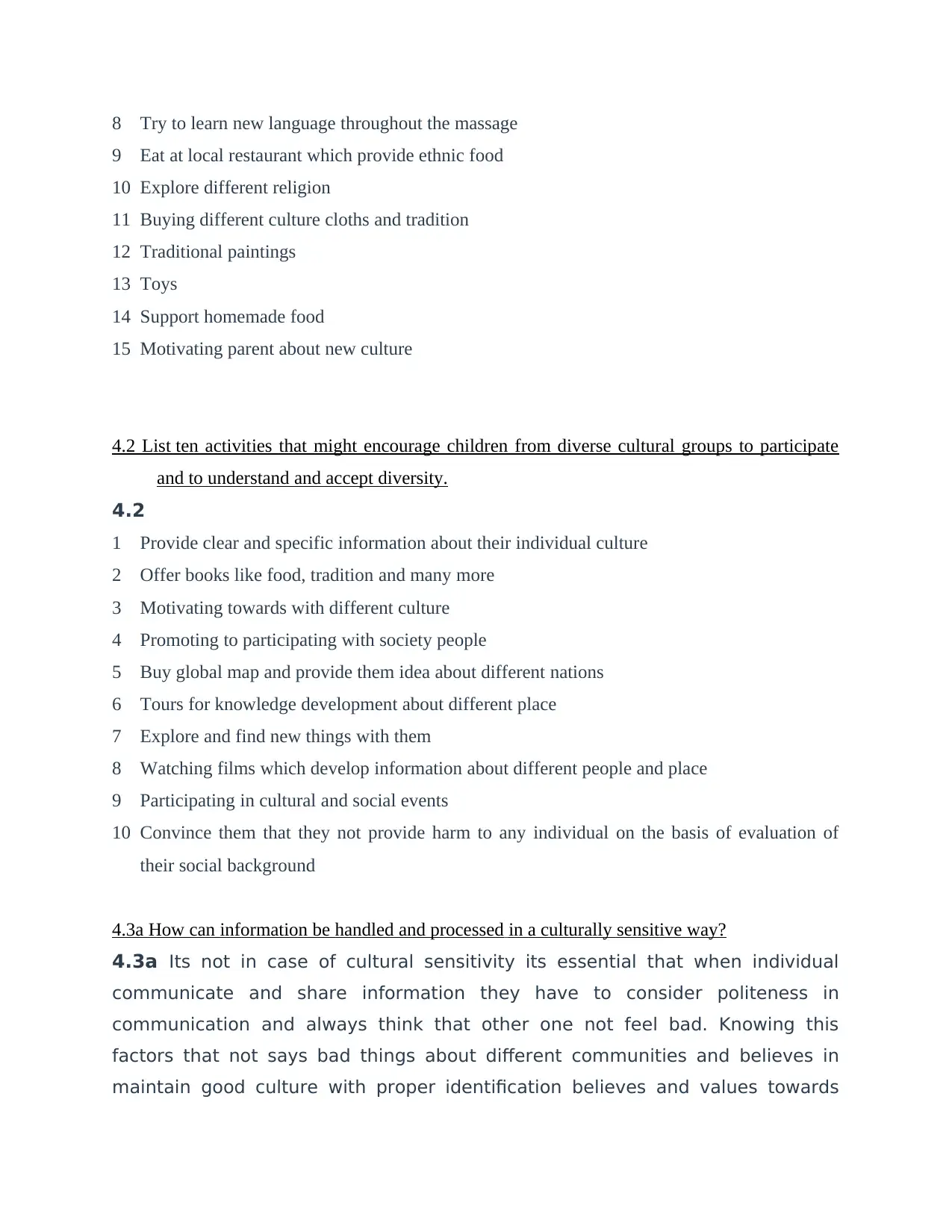
8 Try to learn new language throughout the massage
9 Eat at local restaurant which provide ethnic food
10 Explore different religion
11 Buying different culture cloths and tradition
12 Traditional paintings
13 Toys
14 Support homemade food
15 Motivating parent about new culture
4.2 List ten activities that might encourage children from diverse cultural groups to participate
and to understand and accept diversity.
4.2
1 Provide clear and specific information about their individual culture
2 Offer books like food, tradition and many more
3 Motivating towards with different culture
4 Promoting to participating with society people
5 Buy global map and provide them idea about different nations
6 Tours for knowledge development about different place
7 Explore and find new things with them
8 Watching films which develop information about different people and place
9 Participating in cultural and social events
10 Convince them that they not provide harm to any individual on the basis of evaluation of
their social background
4.3a How can information be handled and processed in a culturally sensitive way?
4.3a Its not in case of cultural sensitivity its essential that when individual
communicate and share information they have to consider politeness in
communication and always think that other one not feel bad. Knowing this
factors that not says bad things about different communities and believes in
maintain good culture with proper identification believes and values towards
9 Eat at local restaurant which provide ethnic food
10 Explore different religion
11 Buying different culture cloths and tradition
12 Traditional paintings
13 Toys
14 Support homemade food
15 Motivating parent about new culture
4.2 List ten activities that might encourage children from diverse cultural groups to participate
and to understand and accept diversity.
4.2
1 Provide clear and specific information about their individual culture
2 Offer books like food, tradition and many more
3 Motivating towards with different culture
4 Promoting to participating with society people
5 Buy global map and provide them idea about different nations
6 Tours for knowledge development about different place
7 Explore and find new things with them
8 Watching films which develop information about different people and place
9 Participating in cultural and social events
10 Convince them that they not provide harm to any individual on the basis of evaluation of
their social background
4.3a How can information be handled and processed in a culturally sensitive way?
4.3a Its not in case of cultural sensitivity its essential that when individual
communicate and share information they have to consider politeness in
communication and always think that other one not feel bad. Knowing this
factors that not says bad things about different communities and believes in
maintain good culture with proper identification believes and values towards
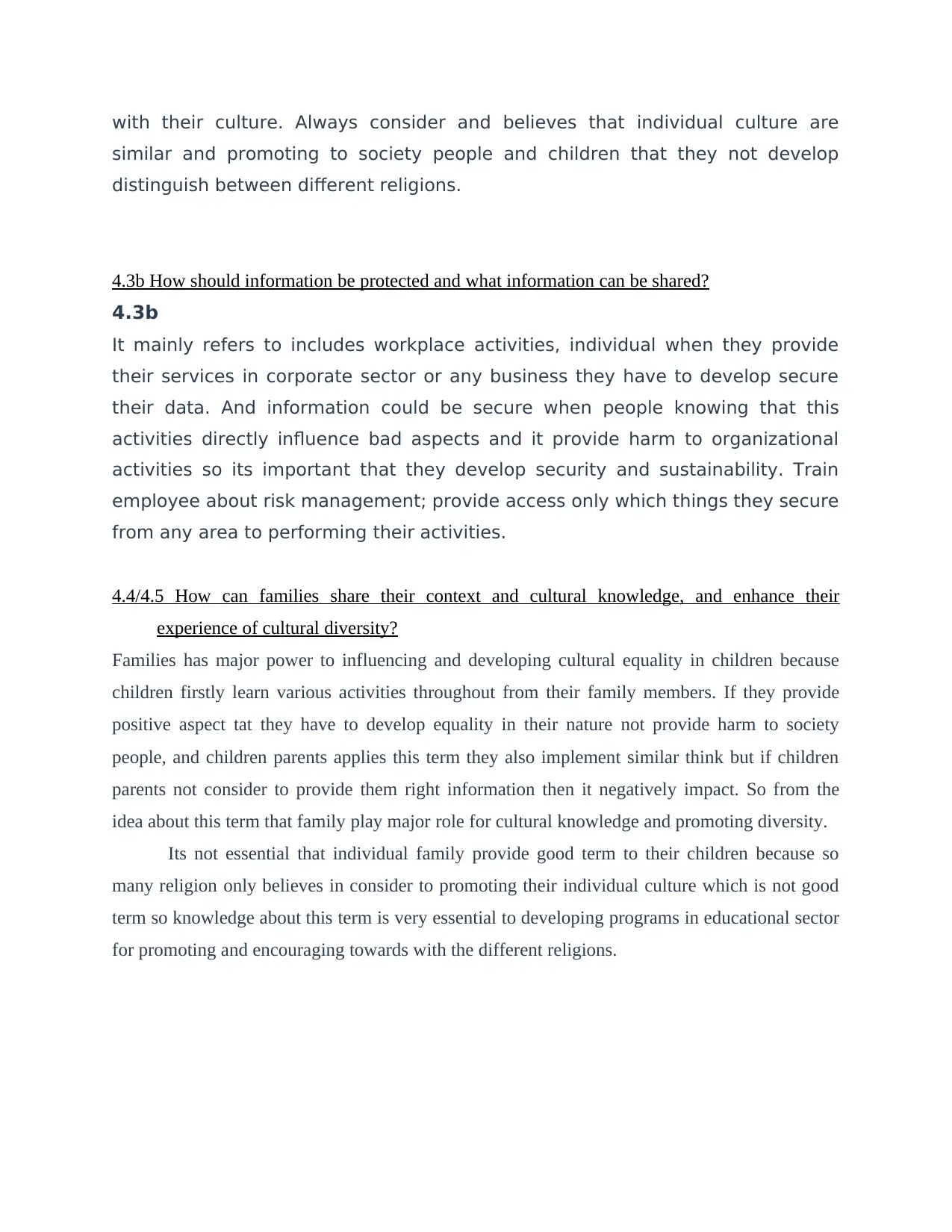
with their culture. Always consider and believes that individual culture are
similar and promoting to society people and children that they not develop
distinguish between different religions.
4.3b How should information be protected and what information can be shared?
4.3b
It mainly refers to includes workplace activities, individual when they provide
their services in corporate sector or any business they have to develop secure
their data. And information could be secure when people knowing that this
activities directly influence bad aspects and it provide harm to organizational
activities so its important that they develop security and sustainability. Train
employee about risk management; provide access only which things they secure
from any area to performing their activities.
4.4/4.5 How can families share their context and cultural knowledge, and enhance their
experience of cultural diversity?
Families has major power to influencing and developing cultural equality in children because
children firstly learn various activities throughout from their family members. If they provide
positive aspect tat they have to develop equality in their nature not provide harm to society
people, and children parents applies this term they also implement similar think but if children
parents not consider to provide them right information then it negatively impact. So from the
idea about this term that family play major role for cultural knowledge and promoting diversity.
Its not essential that individual family provide good term to their children because so
many religion only believes in consider to promoting their individual culture which is not good
term so knowledge about this term is very essential to developing programs in educational sector
for promoting and encouraging towards with the different religions.
similar and promoting to society people and children that they not develop
distinguish between different religions.
4.3b How should information be protected and what information can be shared?
4.3b
It mainly refers to includes workplace activities, individual when they provide
their services in corporate sector or any business they have to develop secure
their data. And information could be secure when people knowing that this
activities directly influence bad aspects and it provide harm to organizational
activities so its important that they develop security and sustainability. Train
employee about risk management; provide access only which things they secure
from any area to performing their activities.
4.4/4.5 How can families share their context and cultural knowledge, and enhance their
experience of cultural diversity?
Families has major power to influencing and developing cultural equality in children because
children firstly learn various activities throughout from their family members. If they provide
positive aspect tat they have to develop equality in their nature not provide harm to society
people, and children parents applies this term they also implement similar think but if children
parents not consider to provide them right information then it negatively impact. So from the
idea about this term that family play major role for cultural knowledge and promoting diversity.
Its not essential that individual family provide good term to their children because so
many religion only believes in consider to promoting their individual culture which is not good
term so knowledge about this term is very essential to developing programs in educational sector
for promoting and encouraging towards with the different religions.
Secure Best Marks with AI Grader
Need help grading? Try our AI Grader for instant feedback on your assignments.
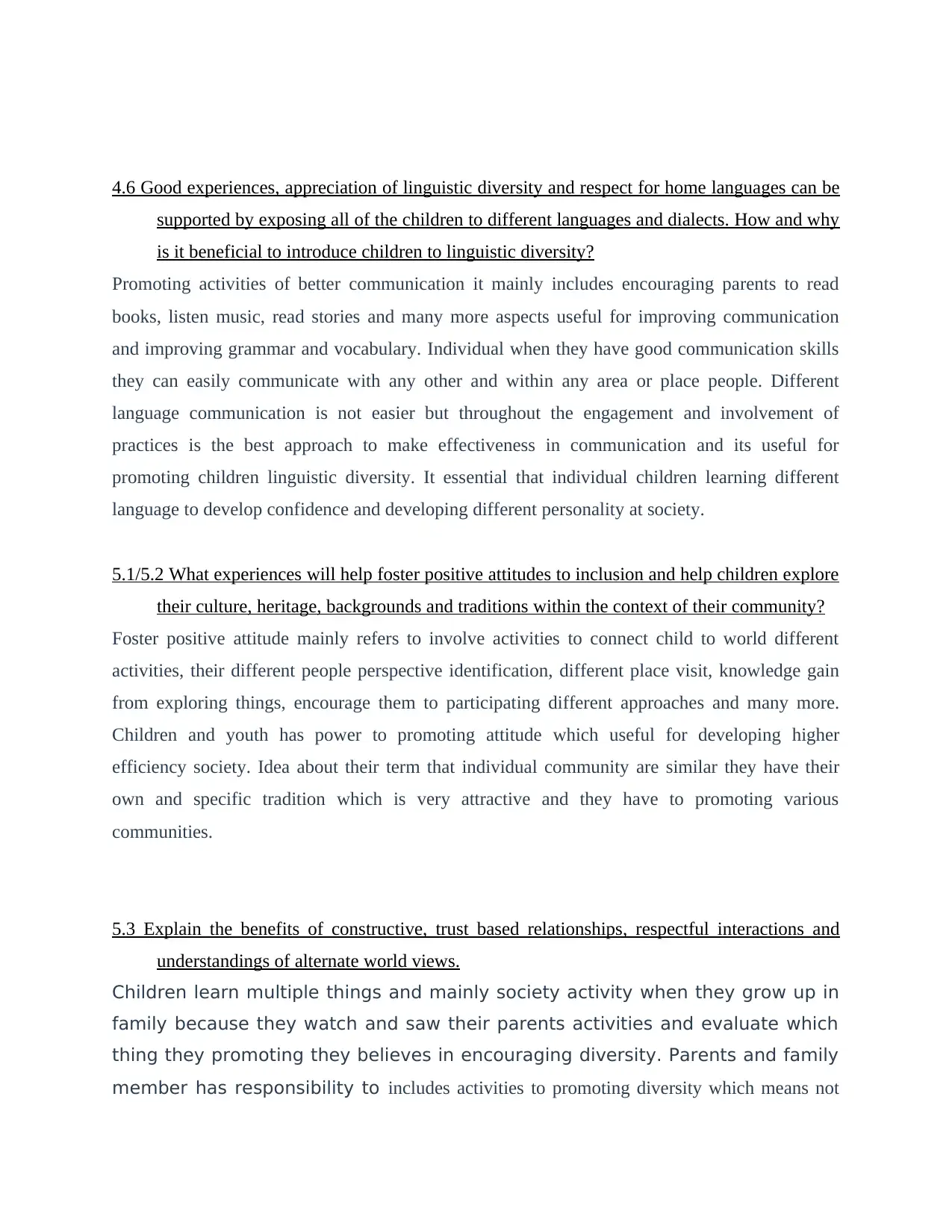
4.6 Good experiences, appreciation of linguistic diversity and respect for home languages can be
supported by exposing all of the children to different languages and dialects. How and why
is it beneficial to introduce children to linguistic diversity?
Promoting activities of better communication it mainly includes encouraging parents to read
books, listen music, read stories and many more aspects useful for improving communication
and improving grammar and vocabulary. Individual when they have good communication skills
they can easily communicate with any other and within any area or place people. Different
language communication is not easier but throughout the engagement and involvement of
practices is the best approach to make effectiveness in communication and its useful for
promoting children linguistic diversity. It essential that individual children learning different
language to develop confidence and developing different personality at society.
5.1/5.2 What experiences will help foster positive attitudes to inclusion and help children explore
their culture, heritage, backgrounds and traditions within the context of their community?
Foster positive attitude mainly refers to involve activities to connect child to world different
activities, their different people perspective identification, different place visit, knowledge gain
from exploring things, encourage them to participating different approaches and many more.
Children and youth has power to promoting attitude which useful for developing higher
efficiency society. Idea about their term that individual community are similar they have their
own and specific tradition which is very attractive and they have to promoting various
communities.
5.3 Explain the benefits of constructive, trust based relationships, respectful interactions and
understandings of alternate world views.
Children learn multiple things and mainly society activity when they grow up in
family because they watch and saw their parents activities and evaluate which
thing they promoting they believes in encouraging diversity. Parents and family
member has responsibility to includes activities to promoting diversity which means not
supported by exposing all of the children to different languages and dialects. How and why
is it beneficial to introduce children to linguistic diversity?
Promoting activities of better communication it mainly includes encouraging parents to read
books, listen music, read stories and many more aspects useful for improving communication
and improving grammar and vocabulary. Individual when they have good communication skills
they can easily communicate with any other and within any area or place people. Different
language communication is not easier but throughout the engagement and involvement of
practices is the best approach to make effectiveness in communication and its useful for
promoting children linguistic diversity. It essential that individual children learning different
language to develop confidence and developing different personality at society.
5.1/5.2 What experiences will help foster positive attitudes to inclusion and help children explore
their culture, heritage, backgrounds and traditions within the context of their community?
Foster positive attitude mainly refers to involve activities to connect child to world different
activities, their different people perspective identification, different place visit, knowledge gain
from exploring things, encourage them to participating different approaches and many more.
Children and youth has power to promoting attitude which useful for developing higher
efficiency society. Idea about their term that individual community are similar they have their
own and specific tradition which is very attractive and they have to promoting various
communities.
5.3 Explain the benefits of constructive, trust based relationships, respectful interactions and
understandings of alternate world views.
Children learn multiple things and mainly society activity when they grow up in
family because they watch and saw their parents activities and evaluate which
thing they promoting they believes in encouraging diversity. Parents and family
member has responsibility to includes activities to promoting diversity which means not
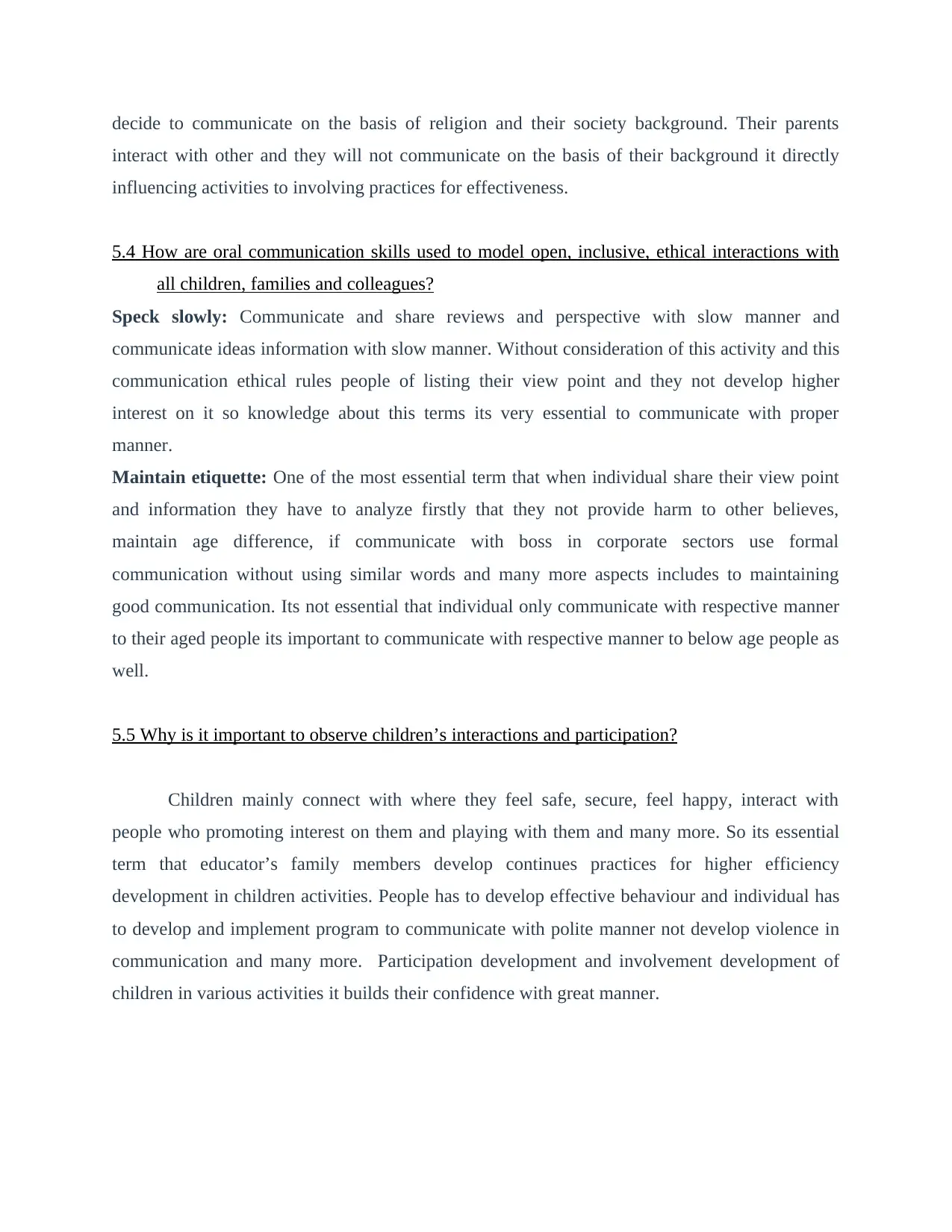
decide to communicate on the basis of religion and their society background. Their parents
interact with other and they will not communicate on the basis of their background it directly
influencing activities to involving practices for effectiveness.
5.4 How are oral communication skills used to model open, inclusive, ethical interactions with
all children, families and colleagues?
Speck slowly: Communicate and share reviews and perspective with slow manner and
communicate ideas information with slow manner. Without consideration of this activity and this
communication ethical rules people of listing their view point and they not develop higher
interest on it so knowledge about this terms its very essential to communicate with proper
manner.
Maintain etiquette: One of the most essential term that when individual share their view point
and information they have to analyze firstly that they not provide harm to other believes,
maintain age difference, if communicate with boss in corporate sectors use formal
communication without using similar words and many more aspects includes to maintaining
good communication. Its not essential that individual only communicate with respective manner
to their aged people its important to communicate with respective manner to below age people as
well.
5.5 Why is it important to observe children’s interactions and participation?
Children mainly connect with where they feel safe, secure, feel happy, interact with
people who promoting interest on them and playing with them and many more. So its essential
term that educator’s family members develop continues practices for higher efficiency
development in children activities. People has to develop effective behaviour and individual has
to develop and implement program to communicate with polite manner not develop violence in
communication and many more. Participation development and involvement development of
children in various activities it builds their confidence with great manner.
interact with other and they will not communicate on the basis of their background it directly
influencing activities to involving practices for effectiveness.
5.4 How are oral communication skills used to model open, inclusive, ethical interactions with
all children, families and colleagues?
Speck slowly: Communicate and share reviews and perspective with slow manner and
communicate ideas information with slow manner. Without consideration of this activity and this
communication ethical rules people of listing their view point and they not develop higher
interest on it so knowledge about this terms its very essential to communicate with proper
manner.
Maintain etiquette: One of the most essential term that when individual share their view point
and information they have to analyze firstly that they not provide harm to other believes,
maintain age difference, if communicate with boss in corporate sectors use formal
communication without using similar words and many more aspects includes to maintaining
good communication. Its not essential that individual only communicate with respective manner
to their aged people its important to communicate with respective manner to below age people as
well.
5.5 Why is it important to observe children’s interactions and participation?
Children mainly connect with where they feel safe, secure, feel happy, interact with
people who promoting interest on them and playing with them and many more. So its essential
term that educator’s family members develop continues practices for higher efficiency
development in children activities. People has to develop effective behaviour and individual has
to develop and implement program to communicate with polite manner not develop violence in
communication and many more. Participation development and involvement development of
children in various activities it builds their confidence with great manner.
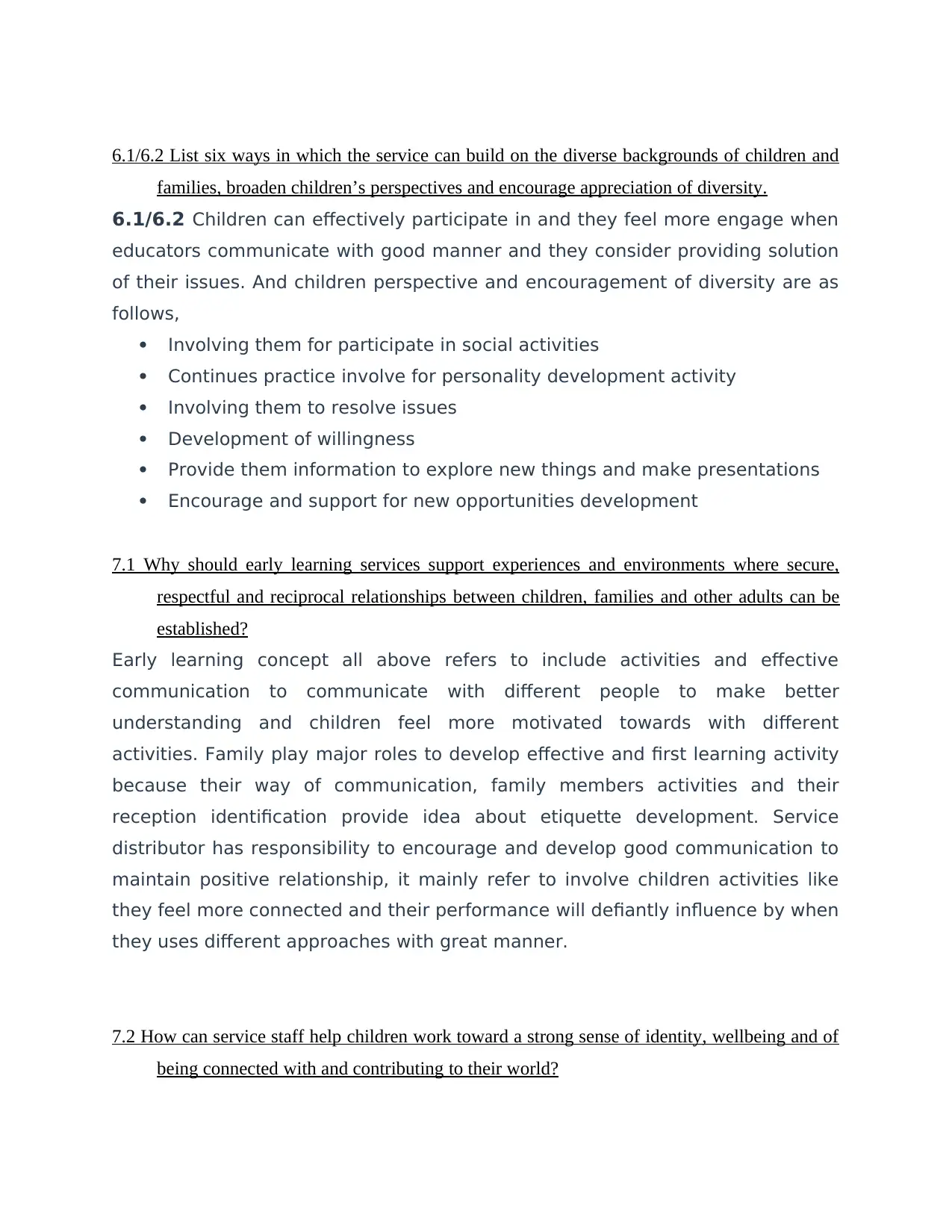
6.1/6.2 List six ways in which the service can build on the diverse backgrounds of children and
families, broaden children’s perspectives and encourage appreciation of diversity.
6.1/6.2 Children can effectively participate in and they feel more engage when
educators communicate with good manner and they consider providing solution
of their issues. And children perspective and encouragement of diversity are as
follows,
Involving them for participate in social activities
Continues practice involve for personality development activity
Involving them to resolve issues
Development of willingness
Provide them information to explore new things and make presentations
Encourage and support for new opportunities development
7.1 Why should early learning services support experiences and environments where secure,
respectful and reciprocal relationships between children, families and other adults can be
established?
Early learning concept all above refers to include activities and effective
communication to communicate with different people to make better
understanding and children feel more motivated towards with different
activities. Family play major roles to develop effective and first learning activity
because their way of communication, family members activities and their
reception identification provide idea about etiquette development. Service
distributor has responsibility to encourage and develop good communication to
maintain positive relationship, it mainly refer to involve children activities like
they feel more connected and their performance will defiantly influence by when
they uses different approaches with great manner.
7.2 How can service staff help children work toward a strong sense of identity, wellbeing and of
being connected with and contributing to their world?
families, broaden children’s perspectives and encourage appreciation of diversity.
6.1/6.2 Children can effectively participate in and they feel more engage when
educators communicate with good manner and they consider providing solution
of their issues. And children perspective and encouragement of diversity are as
follows,
Involving them for participate in social activities
Continues practice involve for personality development activity
Involving them to resolve issues
Development of willingness
Provide them information to explore new things and make presentations
Encourage and support for new opportunities development
7.1 Why should early learning services support experiences and environments where secure,
respectful and reciprocal relationships between children, families and other adults can be
established?
Early learning concept all above refers to include activities and effective
communication to communicate with different people to make better
understanding and children feel more motivated towards with different
activities. Family play major roles to develop effective and first learning activity
because their way of communication, family members activities and their
reception identification provide idea about etiquette development. Service
distributor has responsibility to encourage and develop good communication to
maintain positive relationship, it mainly refer to involve children activities like
they feel more connected and their performance will defiantly influence by when
they uses different approaches with great manner.
7.2 How can service staff help children work toward a strong sense of identity, wellbeing and of
being connected with and contributing to their world?
Paraphrase This Document
Need a fresh take? Get an instant paraphrase of this document with our AI Paraphraser
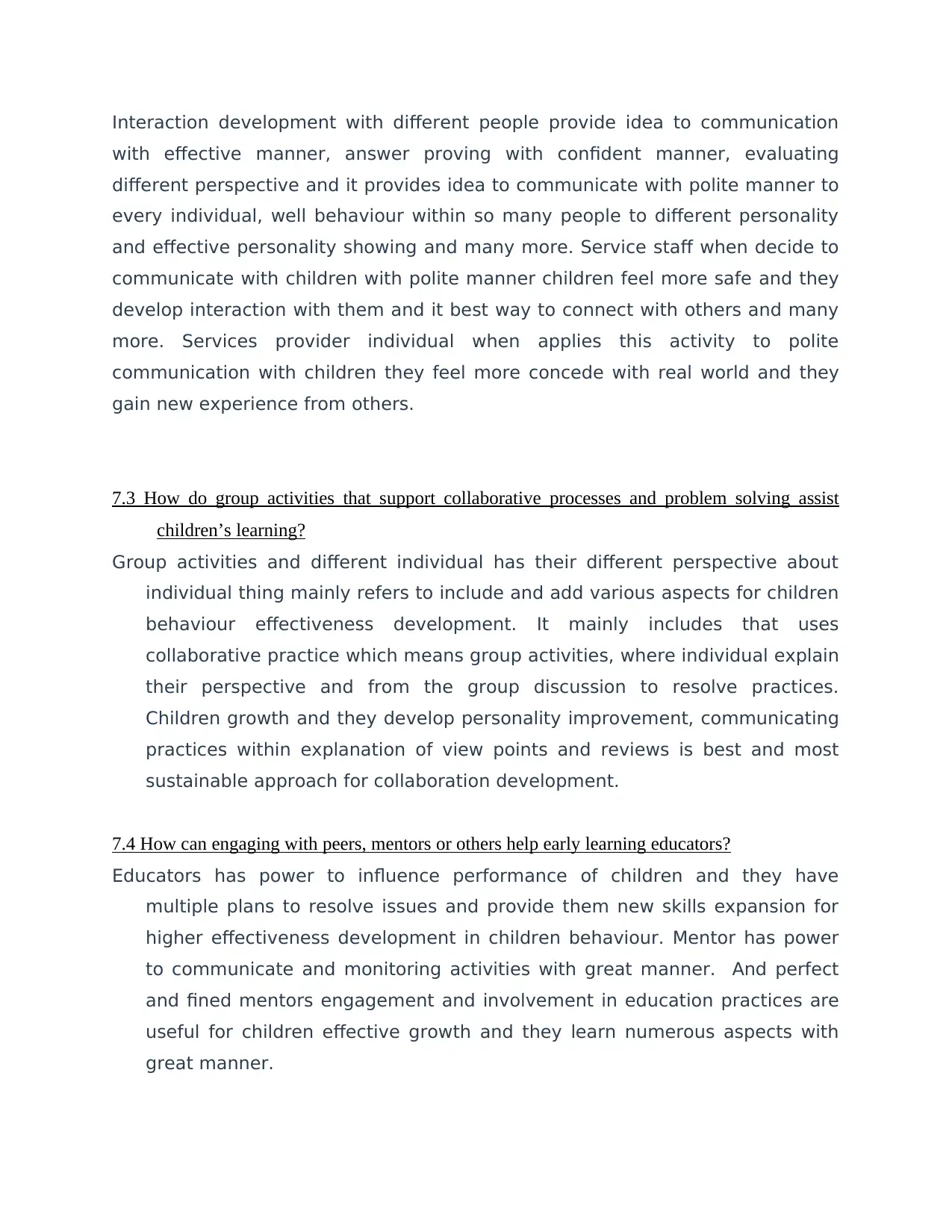
Interaction development with different people provide idea to communication
with effective manner, answer proving with confident manner, evaluating
different perspective and it provides idea to communicate with polite manner to
every individual, well behaviour within so many people to different personality
and effective personality showing and many more. Service staff when decide to
communicate with children with polite manner children feel more safe and they
develop interaction with them and it best way to connect with others and many
more. Services provider individual when applies this activity to polite
communication with children they feel more concede with real world and they
gain new experience from others.
7.3 How do group activities that support collaborative processes and problem solving assist
children’s learning?
Group activities and different individual has their different perspective about
individual thing mainly refers to include and add various aspects for children
behaviour effectiveness development. It mainly includes that uses
collaborative practice which means group activities, where individual explain
their perspective and from the group discussion to resolve practices.
Children growth and they develop personality improvement, communicating
practices within explanation of view points and reviews is best and most
sustainable approach for collaboration development.
7.4 How can engaging with peers, mentors or others help early learning educators?
Educators has power to influence performance of children and they have
multiple plans to resolve issues and provide them new skills expansion for
higher effectiveness development in children behaviour. Mentor has power
to communicate and monitoring activities with great manner. And perfect
and fined mentors engagement and involvement in education practices are
useful for children effective growth and they learn numerous aspects with
great manner.
with effective manner, answer proving with confident manner, evaluating
different perspective and it provides idea to communicate with polite manner to
every individual, well behaviour within so many people to different personality
and effective personality showing and many more. Service staff when decide to
communicate with children with polite manner children feel more safe and they
develop interaction with them and it best way to connect with others and many
more. Services provider individual when applies this activity to polite
communication with children they feel more concede with real world and they
gain new experience from others.
7.3 How do group activities that support collaborative processes and problem solving assist
children’s learning?
Group activities and different individual has their different perspective about
individual thing mainly refers to include and add various aspects for children
behaviour effectiveness development. It mainly includes that uses
collaborative practice which means group activities, where individual explain
their perspective and from the group discussion to resolve practices.
Children growth and they develop personality improvement, communicating
practices within explanation of view points and reviews is best and most
sustainable approach for collaboration development.
7.4 How can engaging with peers, mentors or others help early learning educators?
Educators has power to influence performance of children and they have
multiple plans to resolve issues and provide them new skills expansion for
higher effectiveness development in children behaviour. Mentor has power
to communicate and monitoring activities with great manner. And perfect
and fined mentors engagement and involvement in education practices are
useful for children effective growth and they learn numerous aspects with
great manner.
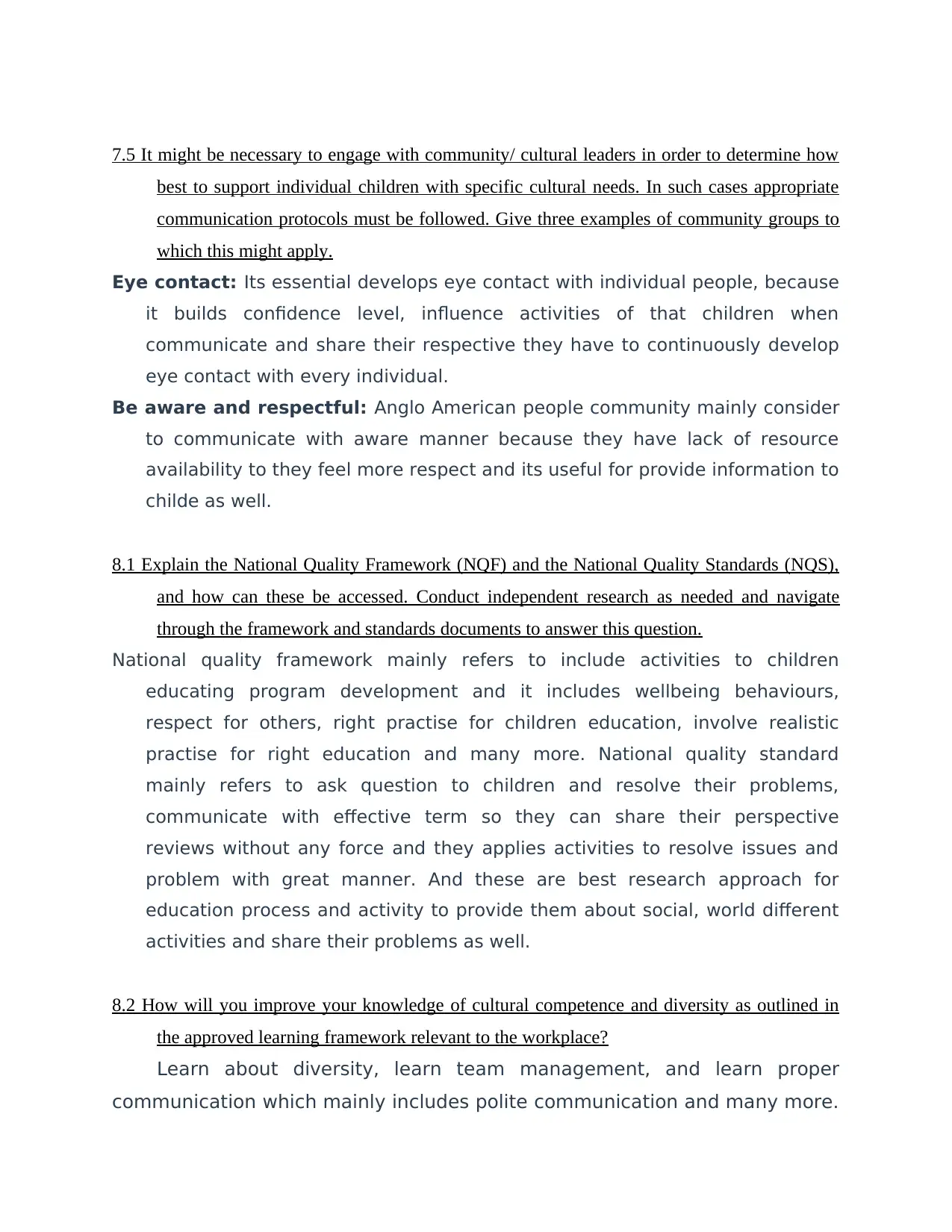
7.5 It might be necessary to engage with community/ cultural leaders in order to determine how
best to support individual children with specific cultural needs. In such cases appropriate
communication protocols must be followed. Give three examples of community groups to
which this might apply.
Eye contact: Its essential develops eye contact with individual people, because
it builds confidence level, influence activities of that children when
communicate and share their respective they have to continuously develop
eye contact with every individual.
Be aware and respectful: Anglo American people community mainly consider
to communicate with aware manner because they have lack of resource
availability to they feel more respect and its useful for provide information to
childe as well.
8.1 Explain the National Quality Framework (NQF) and the National Quality Standards (NQS),
and how can these be accessed. Conduct independent research as needed and navigate
through the framework and standards documents to answer this question.
National quality framework mainly refers to include activities to children
educating program development and it includes wellbeing behaviours,
respect for others, right practise for children education, involve realistic
practise for right education and many more. National quality standard
mainly refers to ask question to children and resolve their problems,
communicate with effective term so they can share their perspective
reviews without any force and they applies activities to resolve issues and
problem with great manner. And these are best research approach for
education process and activity to provide them about social, world different
activities and share their problems as well.
8.2 How will you improve your knowledge of cultural competence and diversity as outlined in
the approved learning framework relevant to the workplace?
Learn about diversity, learn team management, and learn proper
communication which mainly includes polite communication and many more.
best to support individual children with specific cultural needs. In such cases appropriate
communication protocols must be followed. Give three examples of community groups to
which this might apply.
Eye contact: Its essential develops eye contact with individual people, because
it builds confidence level, influence activities of that children when
communicate and share their respective they have to continuously develop
eye contact with every individual.
Be aware and respectful: Anglo American people community mainly consider
to communicate with aware manner because they have lack of resource
availability to they feel more respect and its useful for provide information to
childe as well.
8.1 Explain the National Quality Framework (NQF) and the National Quality Standards (NQS),
and how can these be accessed. Conduct independent research as needed and navigate
through the framework and standards documents to answer this question.
National quality framework mainly refers to include activities to children
educating program development and it includes wellbeing behaviours,
respect for others, right practise for children education, involve realistic
practise for right education and many more. National quality standard
mainly refers to ask question to children and resolve their problems,
communicate with effective term so they can share their perspective
reviews without any force and they applies activities to resolve issues and
problem with great manner. And these are best research approach for
education process and activity to provide them about social, world different
activities and share their problems as well.
8.2 How will you improve your knowledge of cultural competence and diversity as outlined in
the approved learning framework relevant to the workplace?
Learn about diversity, learn team management, and learn proper
communication which mainly includes polite communication and many more.
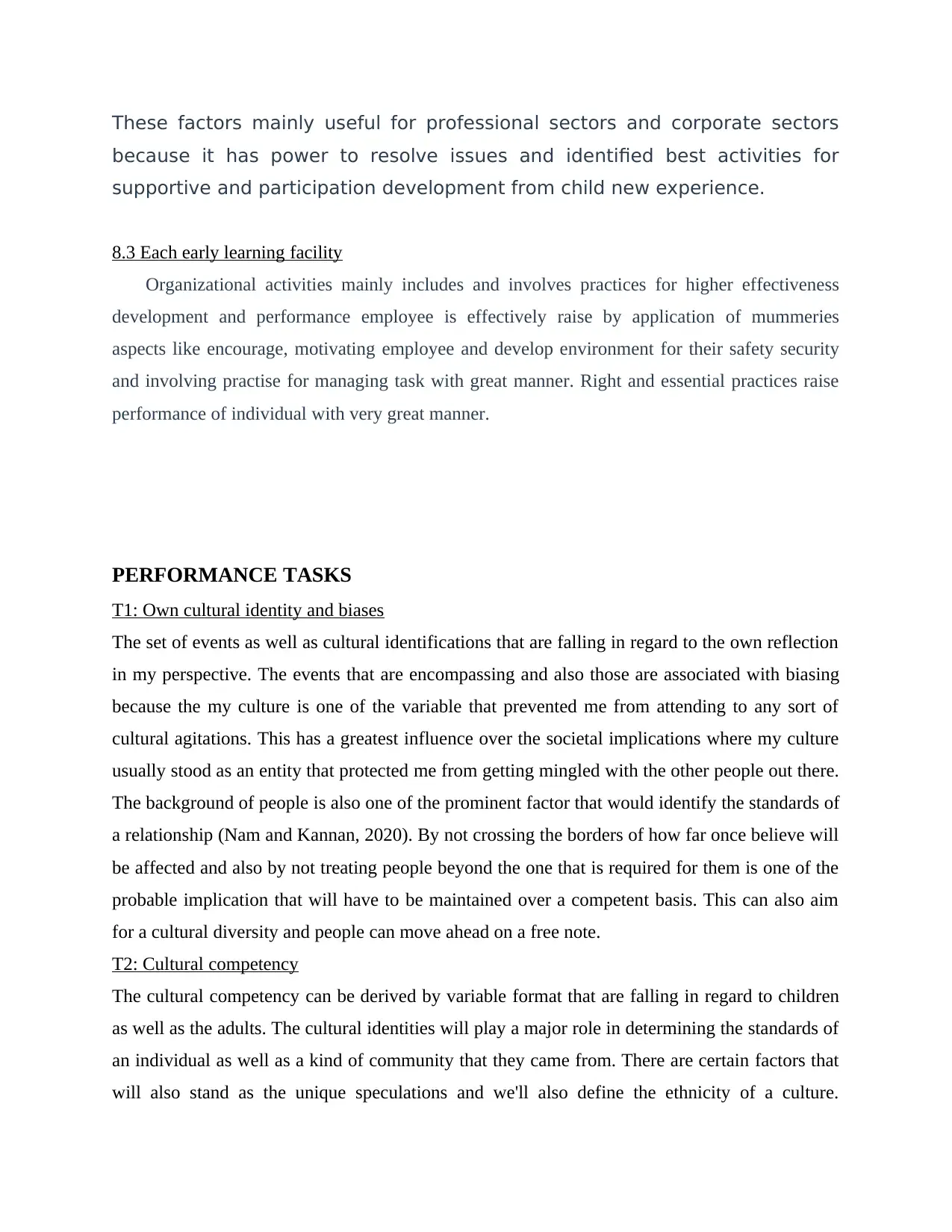
These factors mainly useful for professional sectors and corporate sectors
because it has power to resolve issues and identified best activities for
supportive and participation development from child new experience.
8.3 Each early learning facility
Organizational activities mainly includes and involves practices for higher effectiveness
development and performance employee is effectively raise by application of mummeries
aspects like encourage, motivating employee and develop environment for their safety security
and involving practise for managing task with great manner. Right and essential practices raise
performance of individual with very great manner.
PERFORMANCE TASKS
T1: Own cultural identity and biases
The set of events as well as cultural identifications that are falling in regard to the own reflection
in my perspective. The events that are encompassing and also those are associated with biasing
because the my culture is one of the variable that prevented me from attending to any sort of
cultural agitations. This has a greatest influence over the societal implications where my culture
usually stood as an entity that protected me from getting mingled with the other people out there.
The background of people is also one of the prominent factor that would identify the standards of
a relationship (Nam and Kannan, 2020). By not crossing the borders of how far once believe will
be affected and also by not treating people beyond the one that is required for them is one of the
probable implication that will have to be maintained over a competent basis. This can also aim
for a cultural diversity and people can move ahead on a free note.
T2: Cultural competency
The cultural competency can be derived by variable format that are falling in regard to children
as well as the adults. The cultural identities will play a major role in determining the standards of
an individual as well as a kind of community that they came from. There are certain factors that
will also stand as the unique speculations and we'll also define the ethnicity of a culture.
because it has power to resolve issues and identified best activities for
supportive and participation development from child new experience.
8.3 Each early learning facility
Organizational activities mainly includes and involves practices for higher effectiveness
development and performance employee is effectively raise by application of mummeries
aspects like encourage, motivating employee and develop environment for their safety security
and involving practise for managing task with great manner. Right and essential practices raise
performance of individual with very great manner.
PERFORMANCE TASKS
T1: Own cultural identity and biases
The set of events as well as cultural identifications that are falling in regard to the own reflection
in my perspective. The events that are encompassing and also those are associated with biasing
because the my culture is one of the variable that prevented me from attending to any sort of
cultural agitations. This has a greatest influence over the societal implications where my culture
usually stood as an entity that protected me from getting mingled with the other people out there.
The background of people is also one of the prominent factor that would identify the standards of
a relationship (Nam and Kannan, 2020). By not crossing the borders of how far once believe will
be affected and also by not treating people beyond the one that is required for them is one of the
probable implication that will have to be maintained over a competent basis. This can also aim
for a cultural diversity and people can move ahead on a free note.
T2: Cultural competency
The cultural competency can be derived by variable format that are falling in regard to children
as well as the adults. The cultural identities will play a major role in determining the standards of
an individual as well as a kind of community that they came from. There are certain factors that
will also stand as the unique speculations and we'll also define the ethnicity of a culture.
Secure Best Marks with AI Grader
Need help grading? Try our AI Grader for instant feedback on your assignments.
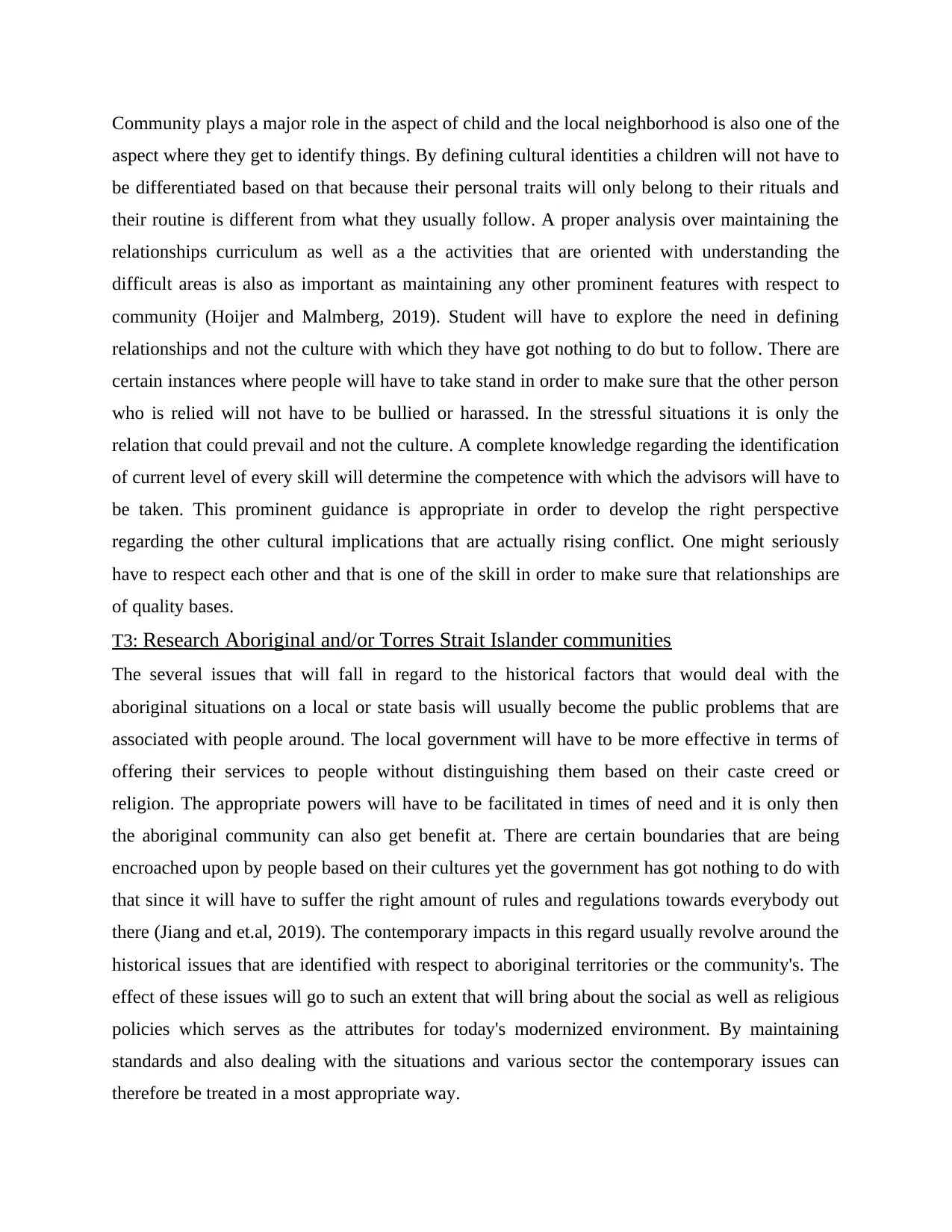
Community plays a major role in the aspect of child and the local neighborhood is also one of the
aspect where they get to identify things. By defining cultural identities a children will not have to
be differentiated based on that because their personal traits will only belong to their rituals and
their routine is different from what they usually follow. A proper analysis over maintaining the
relationships curriculum as well as a the activities that are oriented with understanding the
difficult areas is also as important as maintaining any other prominent features with respect to
community (Hoijer and Malmberg, 2019). Student will have to explore the need in defining
relationships and not the culture with which they have got nothing to do but to follow. There are
certain instances where people will have to take stand in order to make sure that the other person
who is relied will not have to be bullied or harassed. In the stressful situations it is only the
relation that could prevail and not the culture. A complete knowledge regarding the identification
of current level of every skill will determine the competence with which the advisors will have to
be taken. This prominent guidance is appropriate in order to develop the right perspective
regarding the other cultural implications that are actually rising conflict. One might seriously
have to respect each other and that is one of the skill in order to make sure that relationships are
of quality bases.
T3: Research Aboriginal and/or Torres Strait Islander communities
The several issues that will fall in regard to the historical factors that would deal with the
aboriginal situations on a local or state basis will usually become the public problems that are
associated with people around. The local government will have to be more effective in terms of
offering their services to people without distinguishing them based on their caste creed or
religion. The appropriate powers will have to be facilitated in times of need and it is only then
the aboriginal community can also get benefit at. There are certain boundaries that are being
encroached upon by people based on their cultures yet the government has got nothing to do with
that since it will have to suffer the right amount of rules and regulations towards everybody out
there (Jiang and et.al, 2019). The contemporary impacts in this regard usually revolve around the
historical issues that are identified with respect to aboriginal territories or the community's. The
effect of these issues will go to such an extent that will bring about the social as well as religious
policies which serves as the attributes for today's modernized environment. By maintaining
standards and also dealing with the situations and various sector the contemporary issues can
therefore be treated in a most appropriate way.
aspect where they get to identify things. By defining cultural identities a children will not have to
be differentiated based on that because their personal traits will only belong to their rituals and
their routine is different from what they usually follow. A proper analysis over maintaining the
relationships curriculum as well as a the activities that are oriented with understanding the
difficult areas is also as important as maintaining any other prominent features with respect to
community (Hoijer and Malmberg, 2019). Student will have to explore the need in defining
relationships and not the culture with which they have got nothing to do but to follow. There are
certain instances where people will have to take stand in order to make sure that the other person
who is relied will not have to be bullied or harassed. In the stressful situations it is only the
relation that could prevail and not the culture. A complete knowledge regarding the identification
of current level of every skill will determine the competence with which the advisors will have to
be taken. This prominent guidance is appropriate in order to develop the right perspective
regarding the other cultural implications that are actually rising conflict. One might seriously
have to respect each other and that is one of the skill in order to make sure that relationships are
of quality bases.
T3: Research Aboriginal and/or Torres Strait Islander communities
The several issues that will fall in regard to the historical factors that would deal with the
aboriginal situations on a local or state basis will usually become the public problems that are
associated with people around. The local government will have to be more effective in terms of
offering their services to people without distinguishing them based on their caste creed or
religion. The appropriate powers will have to be facilitated in times of need and it is only then
the aboriginal community can also get benefit at. There are certain boundaries that are being
encroached upon by people based on their cultures yet the government has got nothing to do with
that since it will have to suffer the right amount of rules and regulations towards everybody out
there (Jiang and et.al, 2019). The contemporary impacts in this regard usually revolve around the
historical issues that are identified with respect to aboriginal territories or the community's. The
effect of these issues will go to such an extent that will bring about the social as well as religious
policies which serves as the attributes for today's modernized environment. By maintaining
standards and also dealing with the situations and various sector the contemporary issues can
therefore be treated in a most appropriate way.
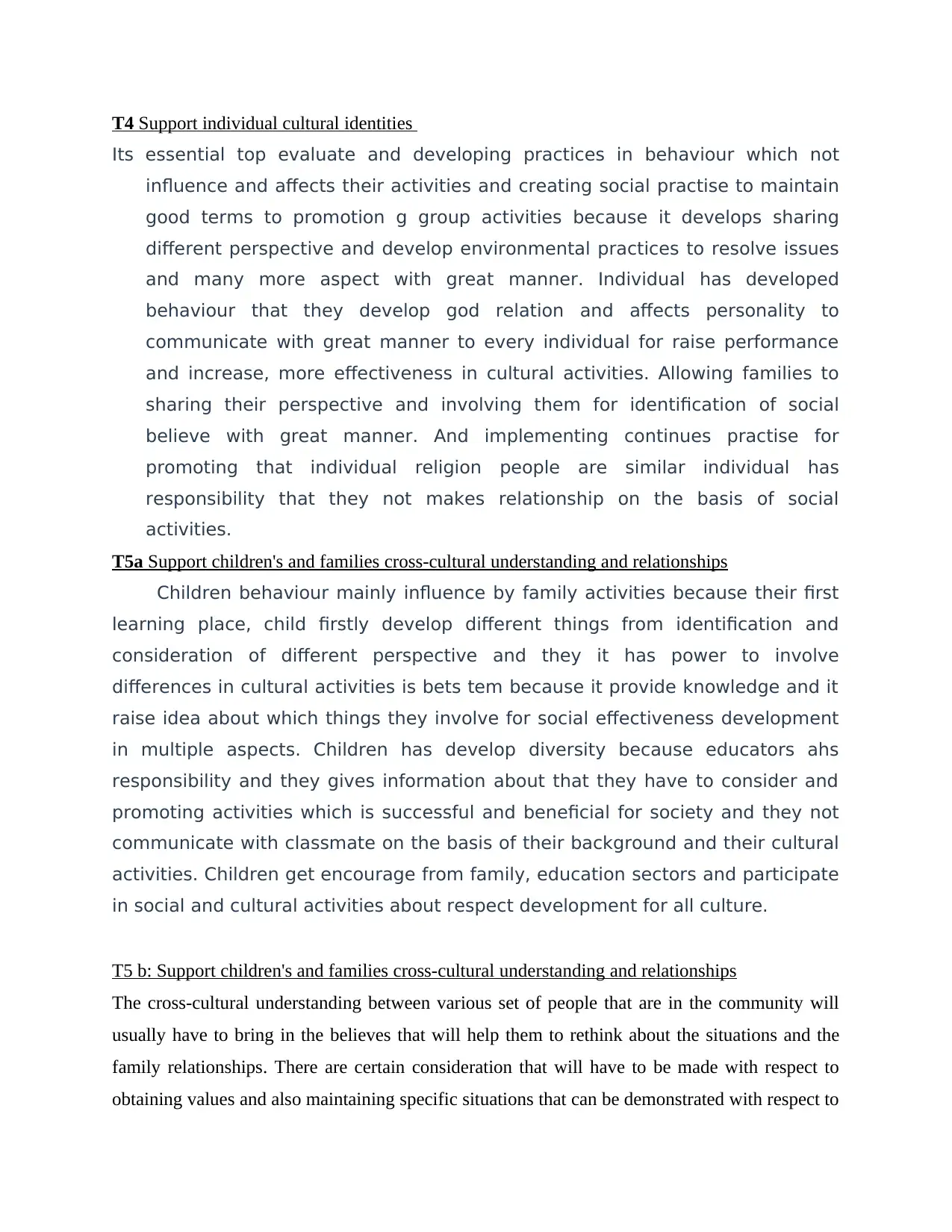
T4 Support individual cultural identities
Its essential top evaluate and developing practices in behaviour which not
influence and affects their activities and creating social practise to maintain
good terms to promotion g group activities because it develops sharing
different perspective and develop environmental practices to resolve issues
and many more aspect with great manner. Individual has developed
behaviour that they develop god relation and affects personality to
communicate with great manner to every individual for raise performance
and increase, more effectiveness in cultural activities. Allowing families to
sharing their perspective and involving them for identification of social
believe with great manner. And implementing continues practise for
promoting that individual religion people are similar individual has
responsibility that they not makes relationship on the basis of social
activities.
T5a Support children's and families cross-cultural understanding and relationships
Children behaviour mainly influence by family activities because their first
learning place, child firstly develop different things from identification and
consideration of different perspective and they it has power to involve
differences in cultural activities is bets tem because it provide knowledge and it
raise idea about which things they involve for social effectiveness development
in multiple aspects. Children has develop diversity because educators ahs
responsibility and they gives information about that they have to consider and
promoting activities which is successful and beneficial for society and they not
communicate with classmate on the basis of their background and their cultural
activities. Children get encourage from family, education sectors and participate
in social and cultural activities about respect development for all culture.
T5 b: Support children's and families cross-cultural understanding and relationships
The cross-cultural understanding between various set of people that are in the community will
usually have to bring in the believes that will help them to rethink about the situations and the
family relationships. There are certain consideration that will have to be made with respect to
obtaining values and also maintaining specific situations that can be demonstrated with respect to
Its essential top evaluate and developing practices in behaviour which not
influence and affects their activities and creating social practise to maintain
good terms to promotion g group activities because it develops sharing
different perspective and develop environmental practices to resolve issues
and many more aspect with great manner. Individual has developed
behaviour that they develop god relation and affects personality to
communicate with great manner to every individual for raise performance
and increase, more effectiveness in cultural activities. Allowing families to
sharing their perspective and involving them for identification of social
believe with great manner. And implementing continues practise for
promoting that individual religion people are similar individual has
responsibility that they not makes relationship on the basis of social
activities.
T5a Support children's and families cross-cultural understanding and relationships
Children behaviour mainly influence by family activities because their first
learning place, child firstly develop different things from identification and
consideration of different perspective and they it has power to involve
differences in cultural activities is bets tem because it provide knowledge and it
raise idea about which things they involve for social effectiveness development
in multiple aspects. Children has develop diversity because educators ahs
responsibility and they gives information about that they have to consider and
promoting activities which is successful and beneficial for society and they not
communicate with classmate on the basis of their background and their cultural
activities. Children get encourage from family, education sectors and participate
in social and cultural activities about respect development for all culture.
T5 b: Support children's and families cross-cultural understanding and relationships
The cross-cultural understanding between various set of people that are in the community will
usually have to bring in the believes that will help them to rethink about the situations and the
family relationships. There are certain consideration that will have to be made with respect to
obtaining values and also maintaining specific situations that can be demonstrated with respect to

essential knowledge. And effective orientation can also be made contingent and that can bring
about a managerial implications with multi cultural communication tactics (Farooq and et.al,
2018). This will impact the usage of effective oral communication techniques that would form a
bridge between the children as well as family that are associated with a particular understanding.
Cultural support and cultural understanding are important derivatives that will have to be
maintained from childhood. This is because it is not until when an observation is portrayed upon
that the children could easily and title the dominance of culture in their life. By making children
understand the fact that culture is just a normal entity from their childhood they will not prioritise
it as one of the important matter yet they try to respected.
T6: Inclusive learning experiences
Children will learn from the onset of time and also the experiences. Therefore their experiences
will have to be built on improving the diversity over the background as well as perspectives.
Children as well as families will have to inculcate the standards of accepting every culture has a
unique set of entity and that could also avoid conflicts. By valuing every prominent factor people
can usually deal with broadening the sense of every perspective that would focus on events and
Customs. Most of the time people get involved into determining the standards of other people
culture only because of not being able to accept them (Park, 2018). There might be certain events
that are related to religious as well as cultural implications and everyone's believe in this regard
would not let them to participate in the other people's activity. In this regard children will have to
be taught from the essence of time where the will have to respect every culture like they do to
their own. Families will also have to participate in encouraging children to mingle with people
and respect Each Other because it is not until when they respect and also move ahead in
accepting the terms and conditions that they get to realise the importance of other people.
T7: Support children in developing confidence and strength in personal and cultural
identity
developing confidence is an important criteria in dealing with the relationships of cultural
implications School staff children families and adult will have to reciprocate the same amount of
positive Vibes by respecting other people and also helping them to be strong. the aboriginal
community in the region will eventually feel insecure because of the lack of confidence that
people would treat them the same and also be strong enough. they will lose their charm by not
getting obligated to the terms and policies and that is also affecting their well-being. by
about a managerial implications with multi cultural communication tactics (Farooq and et.al,
2018). This will impact the usage of effective oral communication techniques that would form a
bridge between the children as well as family that are associated with a particular understanding.
Cultural support and cultural understanding are important derivatives that will have to be
maintained from childhood. This is because it is not until when an observation is portrayed upon
that the children could easily and title the dominance of culture in their life. By making children
understand the fact that culture is just a normal entity from their childhood they will not prioritise
it as one of the important matter yet they try to respected.
T6: Inclusive learning experiences
Children will learn from the onset of time and also the experiences. Therefore their experiences
will have to be built on improving the diversity over the background as well as perspectives.
Children as well as families will have to inculcate the standards of accepting every culture has a
unique set of entity and that could also avoid conflicts. By valuing every prominent factor people
can usually deal with broadening the sense of every perspective that would focus on events and
Customs. Most of the time people get involved into determining the standards of other people
culture only because of not being able to accept them (Park, 2018). There might be certain events
that are related to religious as well as cultural implications and everyone's believe in this regard
would not let them to participate in the other people's activity. In this regard children will have to
be taught from the essence of time where the will have to respect every culture like they do to
their own. Families will also have to participate in encouraging children to mingle with people
and respect Each Other because it is not until when they respect and also move ahead in
accepting the terms and conditions that they get to realise the importance of other people.
T7: Support children in developing confidence and strength in personal and cultural
identity
developing confidence is an important criteria in dealing with the relationships of cultural
implications School staff children families and adult will have to reciprocate the same amount of
positive Vibes by respecting other people and also helping them to be strong. the aboriginal
community in the region will eventually feel insecure because of the lack of confidence that
people would treat them the same and also be strong enough. they will lose their charm by not
getting obligated to the terms and policies and that is also affecting their well-being. by
Paraphrase This Document
Need a fresh take? Get an instant paraphrase of this document with our AI Paraphraser
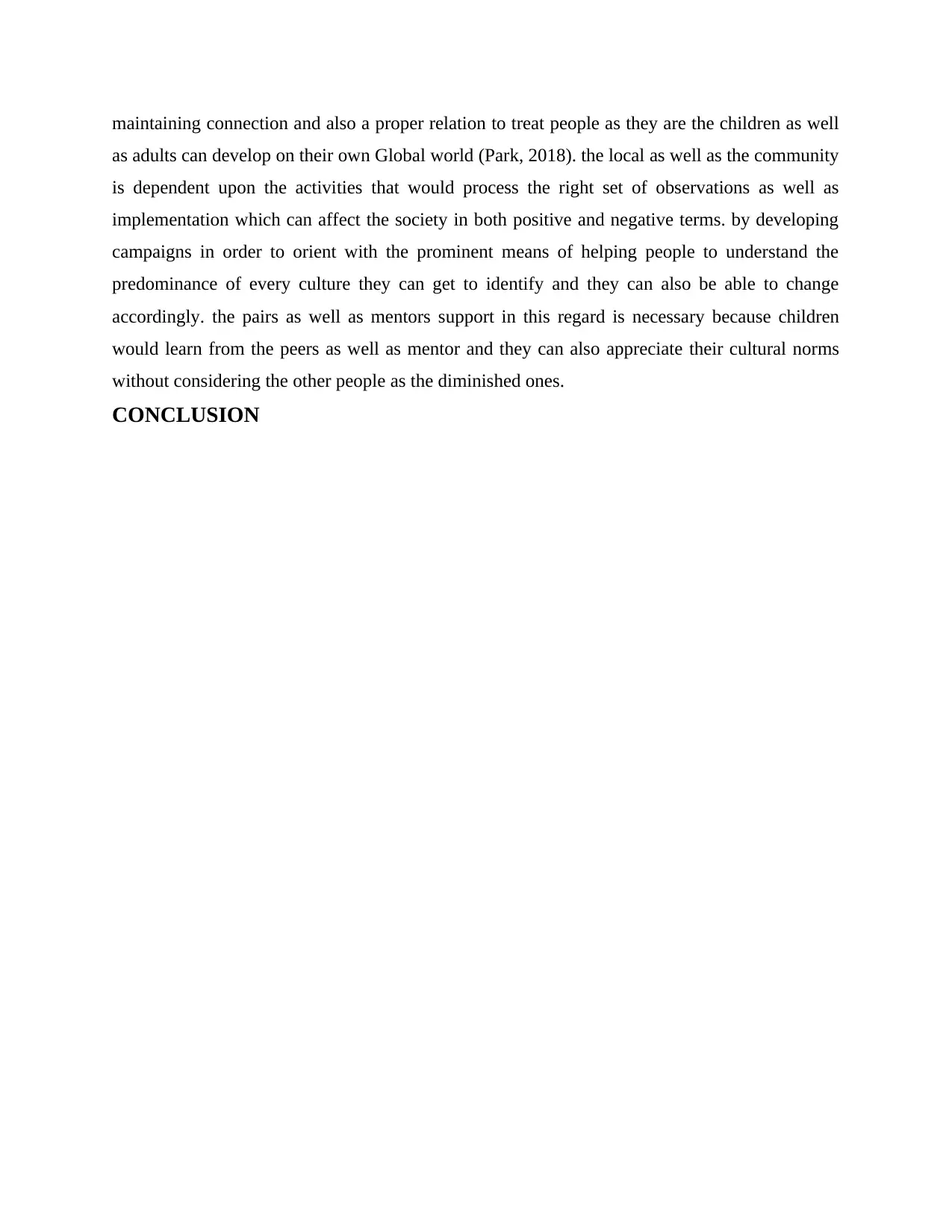
maintaining connection and also a proper relation to treat people as they are the children as well
as adults can develop on their own Global world (Park, 2018). the local as well as the community
is dependent upon the activities that would process the right set of observations as well as
implementation which can affect the society in both positive and negative terms. by developing
campaigns in order to orient with the prominent means of helping people to understand the
predominance of every culture they can get to identify and they can also be able to change
accordingly. the pairs as well as mentors support in this regard is necessary because children
would learn from the peers as well as mentor and they can also appreciate their cultural norms
without considering the other people as the diminished ones.
CONCLUSION
as adults can develop on their own Global world (Park, 2018). the local as well as the community
is dependent upon the activities that would process the right set of observations as well as
implementation which can affect the society in both positive and negative terms. by developing
campaigns in order to orient with the prominent means of helping people to understand the
predominance of every culture they can get to identify and they can also be able to change
accordingly. the pairs as well as mentors support in this regard is necessary because children
would learn from the peers as well as mentor and they can also appreciate their cultural norms
without considering the other people as the diminished ones.
CONCLUSION
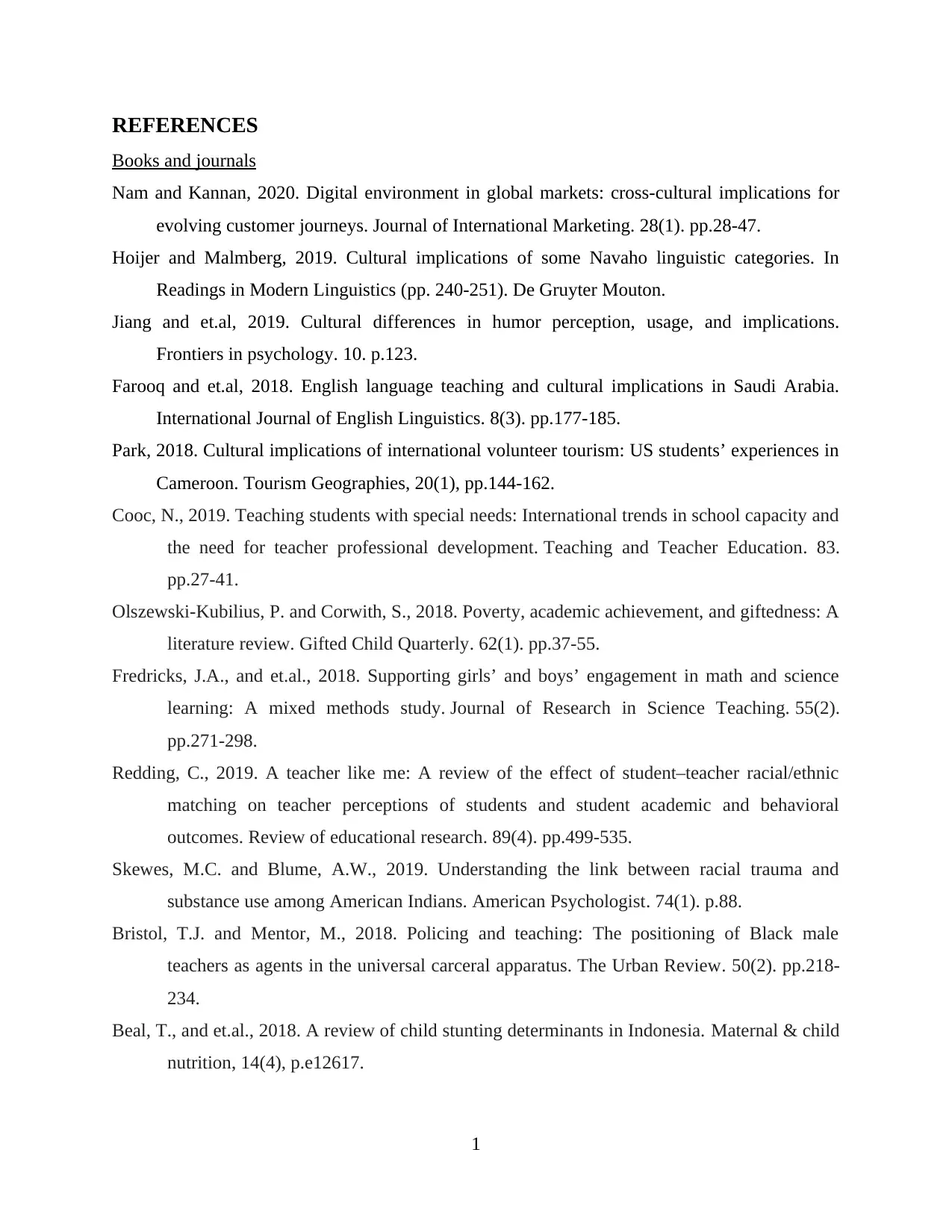
REFERENCES
Books and journals
Nam and Kannan, 2020. Digital environment in global markets: cross-cultural implications for
evolving customer journeys. Journal of International Marketing. 28(1). pp.28-47.
Hoijer and Malmberg, 2019. Cultural implications of some Navaho linguistic categories. In
Readings in Modern Linguistics (pp. 240-251). De Gruyter Mouton.
Jiang and et.al, 2019. Cultural differences in humor perception, usage, and implications.
Frontiers in psychology. 10. p.123.
Farooq and et.al, 2018. English language teaching and cultural implications in Saudi Arabia.
International Journal of English Linguistics. 8(3). pp.177-185.
Park, 2018. Cultural implications of international volunteer tourism: US students’ experiences in
Cameroon. Tourism Geographies, 20(1), pp.144-162.
Cooc, N., 2019. Teaching students with special needs: International trends in school capacity and
the need for teacher professional development. Teaching and Teacher Education. 83.
pp.27-41.
Olszewski-Kubilius, P. and Corwith, S., 2018. Poverty, academic achievement, and giftedness: A
literature review. Gifted Child Quarterly. 62(1). pp.37-55.
Fredricks, J.A., and et.al., 2018. Supporting girls’ and boys’ engagement in math and science
learning: A mixed methods study. Journal of Research in Science Teaching. 55(2).
pp.271-298.
Redding, C., 2019. A teacher like me: A review of the effect of student–teacher racial/ethnic
matching on teacher perceptions of students and student academic and behavioral
outcomes. Review of educational research. 89(4). pp.499-535.
Skewes, M.C. and Blume, A.W., 2019. Understanding the link between racial trauma and
substance use among American Indians. American Psychologist. 74(1). p.88.
Bristol, T.J. and Mentor, M., 2018. Policing and teaching: The positioning of Black male
teachers as agents in the universal carceral apparatus. The Urban Review. 50(2). pp.218-
234.
Beal, T., and et.al., 2018. A review of child stunting determinants in Indonesia. Maternal & child
nutrition, 14(4), p.e12617.
1
Books and journals
Nam and Kannan, 2020. Digital environment in global markets: cross-cultural implications for
evolving customer journeys. Journal of International Marketing. 28(1). pp.28-47.
Hoijer and Malmberg, 2019. Cultural implications of some Navaho linguistic categories. In
Readings in Modern Linguistics (pp. 240-251). De Gruyter Mouton.
Jiang and et.al, 2019. Cultural differences in humor perception, usage, and implications.
Frontiers in psychology. 10. p.123.
Farooq and et.al, 2018. English language teaching and cultural implications in Saudi Arabia.
International Journal of English Linguistics. 8(3). pp.177-185.
Park, 2018. Cultural implications of international volunteer tourism: US students’ experiences in
Cameroon. Tourism Geographies, 20(1), pp.144-162.
Cooc, N., 2019. Teaching students with special needs: International trends in school capacity and
the need for teacher professional development. Teaching and Teacher Education. 83.
pp.27-41.
Olszewski-Kubilius, P. and Corwith, S., 2018. Poverty, academic achievement, and giftedness: A
literature review. Gifted Child Quarterly. 62(1). pp.37-55.
Fredricks, J.A., and et.al., 2018. Supporting girls’ and boys’ engagement in math and science
learning: A mixed methods study. Journal of Research in Science Teaching. 55(2).
pp.271-298.
Redding, C., 2019. A teacher like me: A review of the effect of student–teacher racial/ethnic
matching on teacher perceptions of students and student academic and behavioral
outcomes. Review of educational research. 89(4). pp.499-535.
Skewes, M.C. and Blume, A.W., 2019. Understanding the link between racial trauma and
substance use among American Indians. American Psychologist. 74(1). p.88.
Bristol, T.J. and Mentor, M., 2018. Policing and teaching: The positioning of Black male
teachers as agents in the universal carceral apparatus. The Urban Review. 50(2). pp.218-
234.
Beal, T., and et.al., 2018. A review of child stunting determinants in Indonesia. Maternal & child
nutrition, 14(4), p.e12617.
1
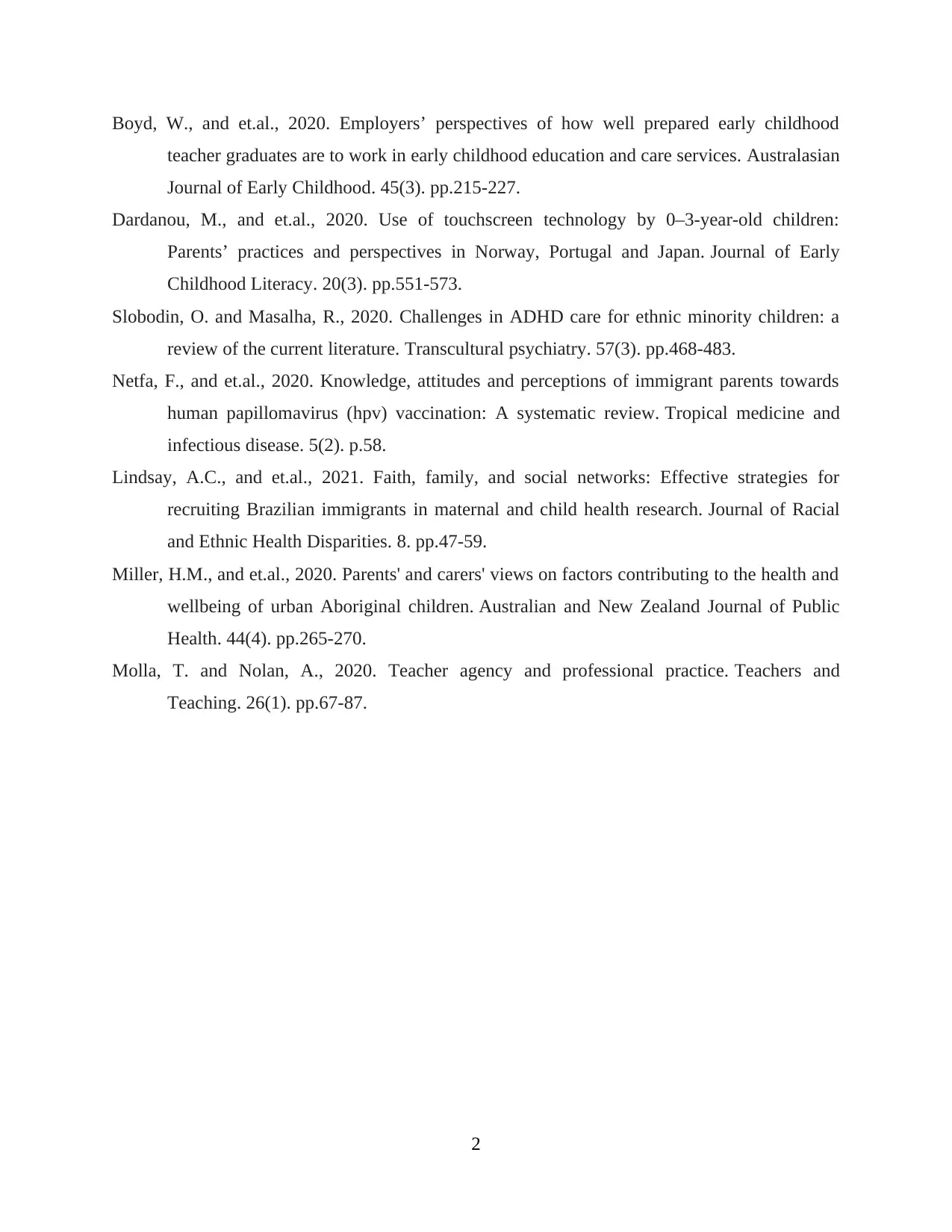
Boyd, W., and et.al., 2020. Employers’ perspectives of how well prepared early childhood
teacher graduates are to work in early childhood education and care services. Australasian
Journal of Early Childhood. 45(3). pp.215-227.
Dardanou, M., and et.al., 2020. Use of touchscreen technology by 0–3-year-old children:
Parents’ practices and perspectives in Norway, Portugal and Japan. Journal of Early
Childhood Literacy. 20(3). pp.551-573.
Slobodin, O. and Masalha, R., 2020. Challenges in ADHD care for ethnic minority children: a
review of the current literature. Transcultural psychiatry. 57(3). pp.468-483.
Netfa, F., and et.al., 2020. Knowledge, attitudes and perceptions of immigrant parents towards
human papillomavirus (hpv) vaccination: A systematic review. Tropical medicine and
infectious disease. 5(2). p.58.
Lindsay, A.C., and et.al., 2021. Faith, family, and social networks: Effective strategies for
recruiting Brazilian immigrants in maternal and child health research. Journal of Racial
and Ethnic Health Disparities. 8. pp.47-59.
Miller, H.M., and et.al., 2020. Parents' and carers' views on factors contributing to the health and
wellbeing of urban Aboriginal children. Australian and New Zealand Journal of Public
Health. 44(4). pp.265-270.
Molla, T. and Nolan, A., 2020. Teacher agency and professional practice. Teachers and
Teaching. 26(1). pp.67-87.
2
teacher graduates are to work in early childhood education and care services. Australasian
Journal of Early Childhood. 45(3). pp.215-227.
Dardanou, M., and et.al., 2020. Use of touchscreen technology by 0–3-year-old children:
Parents’ practices and perspectives in Norway, Portugal and Japan. Journal of Early
Childhood Literacy. 20(3). pp.551-573.
Slobodin, O. and Masalha, R., 2020. Challenges in ADHD care for ethnic minority children: a
review of the current literature. Transcultural psychiatry. 57(3). pp.468-483.
Netfa, F., and et.al., 2020. Knowledge, attitudes and perceptions of immigrant parents towards
human papillomavirus (hpv) vaccination: A systematic review. Tropical medicine and
infectious disease. 5(2). p.58.
Lindsay, A.C., and et.al., 2021. Faith, family, and social networks: Effective strategies for
recruiting Brazilian immigrants in maternal and child health research. Journal of Racial
and Ethnic Health Disparities. 8. pp.47-59.
Miller, H.M., and et.al., 2020. Parents' and carers' views on factors contributing to the health and
wellbeing of urban Aboriginal children. Australian and New Zealand Journal of Public
Health. 44(4). pp.265-270.
Molla, T. and Nolan, A., 2020. Teacher agency and professional practice. Teachers and
Teaching. 26(1). pp.67-87.
2
1 out of 22
Your All-in-One AI-Powered Toolkit for Academic Success.
+13062052269
info@desklib.com
Available 24*7 on WhatsApp / Email
![[object Object]](/_next/static/media/star-bottom.7253800d.svg)
Unlock your academic potential
© 2024 | Zucol Services PVT LTD | All rights reserved.





